 26/06/2010 17:28 26/06/2010 17:28 |
|
| | | OFFLINE | | Post: 20.468
Post: 3.106 | Registrato il: 28/08/2005
Registrato il: 20/01/2009 | Administratore | Utente Master | |
|


 See preceding page for earlier entries today, 6/26/10.
See preceding page for earlier entries today, 6/26/10.
 Saturday, June 26, 12th Week in Ordinary Time
Saturday, June 26, 12th Week in Ordinary Time
 Fourth, fifth and sixth from left: Statue of Llull at the University of Barcelona; 14th century 'Life of Ramon Lull'; and cover of a medieval print of Llull's masterpiece Ars Magna.
BLESSED RAMON LLULL (Raymond Lull) (Mallorca, 1232-1316), Troubadour and Poet, Mystic, Writer-Philosopher-Scientist, Missionary
Fourth, fifth and sixth from left: Statue of Llull at the University of Barcelona; 14th century 'Life of Ramon Lull'; and cover of a medieval print of Llull's masterpiece Ars Magna.
BLESSED RAMON LLULL (Raymond Lull) (Mallorca, 1232-1316), Troubadour and Poet, Mystic, Writer-Philosopher-Scientist, Missionary
One of the towering figures in Catalan history, a 'Renaissance man' born more than two centuries before that era, Llull was born in Palma where he became administrator to King Jaime II of Mallorca, son of Jaime I of Aragon. He married and had two sons, and indulged his talents as a poet and songwriter. At age 30, he had a vision of the crucified Christ which led him to seek the religious life. Counselled by the future St. James of Penafort, he retired to a hermitage where for nine years he also gave rein to his talent for writing - on an encyclopedic scale and on a variety of subjects including the sciences. He also mastered Arabic from one of his family servants and wrote the first-ever Catalan novel. His use of the language was such that it came to be known as 'the language of Llull' much as Castilian Spanish was called 'the language of Cervantes'. He emerged from his solitude to dedicate himself to the cause of mission to the Muslims. He became a lay Franciscan and set up a college where missionaries could learn Arabic. He undertook trips throughout Europe to interest popes, kings and princes in establishing similar colleges for missionaries. On one of his trips, he met Duns Scotus. In 1311, the Council of Vienna ordered the creation of chairs in Hebrew, Arabic and Chaldean in the leading universities of the day - Bologna, Paris, Salamanca and Oxford. when he was 79, he went to North Africa himself to preach. But in Algeria, he was stoned by Muslims. Genoese merchants rescued him and took him back to Mallorca where he died shortly. Llull's encyclopedic writings earned him the title Doctor Illuminatus in his lifetime, and his intellectual endeavors included alchemy experiments without the occult element, as well as mathematical formulas later adopted by Leibniz. Having devised a primitive 'automatic' calculator, he is now recognized as the pioneer of computational science. He was beatified in 1514. [Why have the Catalans and Mallorcans not pushed to have him canonized all this time?]
Readings for today's Mass: www.usccb.org/nab/readings/062610.shtml
OR today.

Addressing the agency that raises funds to finance the Churches of the Middle East, the Pope calls for
'A stable peace and religious freedom for all'
Other Page 1 news: The statements from the Vatican and from the Belgian bishops protesting aspects of the police raids Thursday on properties of the Archdiocese of Marines-Brussels where diocesan files were confiscated, two cardinals' tombs were drilled to allow a camera search for any hidden files within, and the Belgian bishops were detained for ten hours until the raids were completed. In secular news: A backgrounder on the G8-G20 summits in Toronto this weekend and the conflicting strategies of Europe, the USA and China for dealing with the global crisis; a new report on the worsening chaos in Somalia; and a Latin American study for 2008-2009 says 69% of children on the continent are deprived of primary needs.
THE POPE'S DAY
The Holy Father met today with
- Cardinal Giovanni Lajolo, President of the Pontifical Commission for Vatican City State and of the Governatorate
- Cardinal Giovanni Battista Re, Prefect of the Congregation for Bishops (weekly meeting)
- Rev. Ishmael Noko, Secretary General of the World Lutheran Federation
- Delegation from the Circolo San Pietro. Address in Italian.
Vatican-Vietnam relations
The Vatican released a communique on the second meeting of the Vietnam–Holy See Joint Working Group that took place in the Vatican on June 23-24, to follow up the first meeting held in Hanoi last year. The two states are working towards establishing formal diplomatic relations. At this meeting, the Vatican said the Holy Father will soon name a non-resident representative of the Holy See to Vietnam. The Pope met with the President of Vietnam last December.
JPII beatification
hits a snag
Andrea Tornielli writes in Il Giornale today that John Paul II's beatification process has stalled because the miracle cure presented to the Congregation for the Causes of Sainthood failed to pass medixal scrutiny and a new miracle will have to be presented. (I'll translate ASAP).
[Modificato da TERESA BENEDETTA 26/06/2010 17:54] |
| |
|
| |
 26/06/2010 18:37 26/06/2010 18:37 |
|
| | | OFFLINE | Post: 306
Post: 63 | Registrato il: 28/05/2007
Registrato il: 19/02/2009 | Utente Comunità | Utente Junior | |
|
I'm on the floor about the hill climbing, hedge breaking-through story.
I can just picture him brushing off some leaves and dirt and then proceeding straight to the lecure room, as if nothing unusual had happened.
Looking at a picture of the castle (more of a fortress), it must have been SOME climb!
www.naturpark-spessart.de/freizeit/burgen_und_schloesser/burg_rothen...
www.burg-rothenfels.de/
Too funny!! [Modificato da cowgirl2 26/06/2010 18:40] |
| |
 26/06/2010 19:00 26/06/2010 19:00 |
|
| | | OFFLINE | | Post: 20.469
Post: 3.107 | Registrato il: 28/08/2005
Registrato il: 20/01/2009 | Administratore | Utente Master | |
|
 Because of its significance and the inherent interest in this story, I am posting it first on this thread.
John Paul II's beatification stalled:
Because of its significance and the inherent interest in this story, I am posting it first on this thread.
John Paul II's beatification stalled:
'Miracle cure' fails to pass medical criteria
by Andrea Tornielli
Translated from

June 26, 2010
The beatification process for John Paul II is stalled. The word from the Vatican now is that 'there is no hurry' and that another miracle cure may be sought.
The snag is due to the cure attributed to a French nun who was said to have been miraculously cured overnight of Parkinson's disease through the late Pope's intercession. Moreover, there have been questions raised lately about the behavior of prominent members of the Polish Pope's inner circle during his final years .
Thus, even the hypothetical beatification date in the spring of 2011 that had been speculated upon, although still a possiblity, is no longer a certainty.
After the proclamation last Dec. 19 of John Paul II's 'heroic virtues', which took place in record time, the word for now is to proceed cautiously. 'Santo subito', yes, but not right away.
The main difficulty is the presumed miracle cure presented last year by the Pope's postulator, Mons. Stanislaw Oder. It had to do with Sr.
Marie Simon-Pierre, a French nun who was afflicted by a severe form of Parkinson's, the same disease that led to John Paul II's death.
Sister Marie-Pierre, who works in the maternity ward of a hospital in Arles, southern France, inexplicably and instantaneously lost all signs and symptoms of the disease after her fellow nuns prayed to John Paul II for his intercession shortly after his death.
The Congregation for the Causes of Sainthood, having been given all of the necessary medical documentation and the diocesan proceedings regarding the cure, turned over the case to be studied by two specialists in neuro-degenerative diseases.
A meeting of the Congregation's medical advisory board presided by Dr. Patrizio Polisca, head of the Vatican health services department, was expected to rule in April on the medical authenticity of a cure that was scientifically unexplainable.
But one of the two examining specialists expressed doubts over the French doctors' diagnosis that the nun had indeed suffered from Parkinson's disease. The Congregation is seeking the opinion of a third medical expert. At least two doctors should agree on the medical authenticity of a miracle before a ruling can be made. It is thought that this will not come until after the summer.
Once the medical verdict confirms a miracle cure, the case is then passed on to a theological board which must verify whether the miracle occurred after the intercession to the late Pope. With their confirmation, the cause for beatification is then voted on by all the cardinal members of the Congregation. Their approval must then be ratified by Benedict XVI, whose signature will lead to the beatification rite itself.
Authoritative sources tell us that the postulator may, in fact, be asked to present another miracle cure for consideration, because of the problems with the first case.
Papa Wojtyla's popularity, the emotions over his death, the uninterrupted stream of pilgrims visiting his grave, have all resulted in numerous cases of presumably miraculous healing reported. Therefore, Mons. Oder can only have an 'embarrassment of riches' from which to choose if he needs to present a new case.
Those who work at the Congregation say, "There is no need to rush - everything must be done properly, without preferential treatment".
It is also undeniable that in the fast few months, the cause for a Wojtyla 'santo subito' has been set back by reasons other than the difficulties in certifying the miracle cure presented.
The impression is that the Vatican wishes to be particularly cautious especially at a time when suspicions have been raised about some of the most important of those who were closest to the Pope in his final years.
In particular, many questions have surfaced about the management of some high-profile cases of sexual abuse (Groer and Maciel) and the current investigation of Cardinal Sepe for business dealings with Italian officials (when he led the 2000 Jubilee Year organizing committee and from 2001-2006 when he led the Congregation for the propagation of the Faith, with its 9 billion euros worth of income-generating properties in Rome alone).
No one in the Vatican has any doubts about the personal holiness of John Paul II, and questions about his associates' lack of transparency have nothing to do with the cause for his beatification.
But the present caution against rushing the cause is understandable, despite the pressure from the Archbishop of Cracow, Cardinal Stanislaw Dsiwisz, who was Wojtyla's private secretary for 40 years.*
The slowdown also has to do with the expected personnel change soon in the Congregation. The present secretary is due to retire. Candidates to replace him are his undersecretary Mons. Marcello Bartolucci, and the head of the CDF's anti-pedophilia task force, Mons. Charles Scicluna.
* [It must be noted that two of John Paul II's closest associates - Cardinal Angelo Sodano and Cardinal Leonardi Sandri, who were #1 and #2, respectively, in the Secretariat of State during the last decade of the Pontificate - both declined to testify before the Congregation because they see no reason to rush the beatification process. In a letter to the Congregation, Sodano said he believes it is more advisable to decide the pending causes for earlier Popes (Pius XII, John XXIII and John Paul I) before proceeding with John Paul II's cause.
Sodano's reasoning may sound counter-intuitive and even questionable, but John Paul II's cause, much less his personal sanctity, will not be set back by any chronological delay, because in the hearts and minds of many, he is already a saint, and canonization will simply be a formality. When he is eventually canonized, there must be no possibility that anyone can later credibly question the process that led to it.]
[Modificato da TERESA BENEDETTA 26/06/2010 19:06] |
| |
 26/06/2010 23:03 26/06/2010 23:03 |
|
| | | OFFLINE | | Post: 20.470
Post: 3.108 | Registrato il: 28/08/2005
Registrato il: 20/01/2009 | Administratore | Utente Master | |
|
 PAPAL AUDIENCES TODAY
With Rev. Samuel Moko,
PAPAL AUDIENCES TODAY
With Rev. Samuel Moko,
Secretary-General of
the World Lutheran Federation

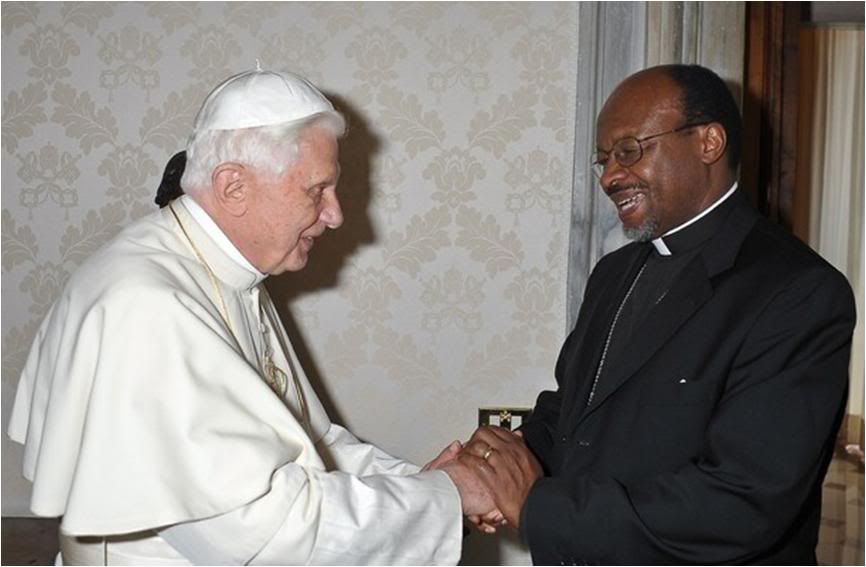
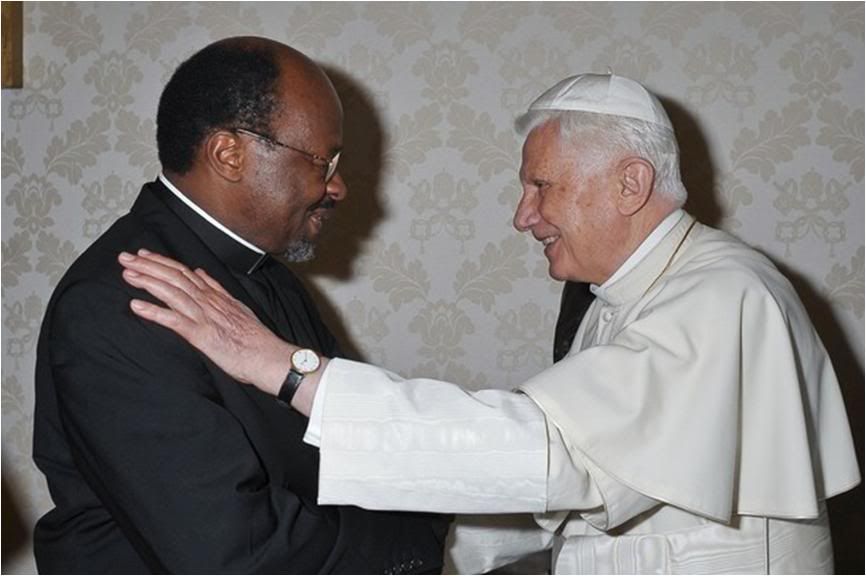
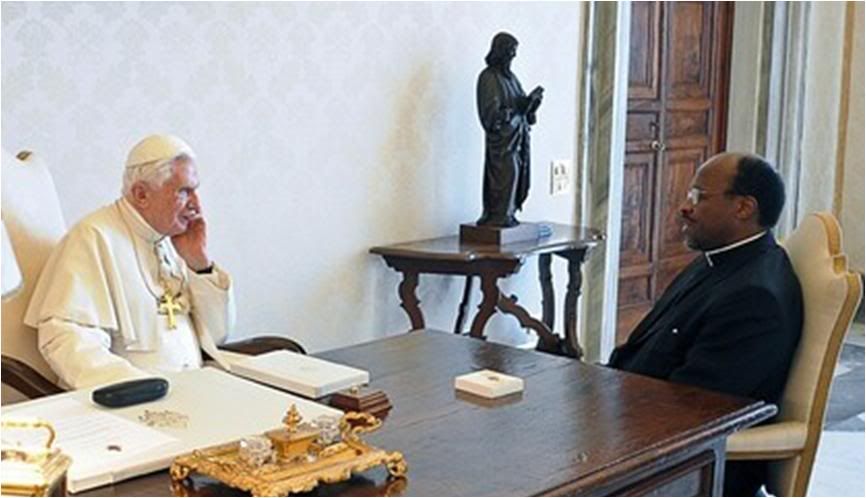
 With the Circolo San Pietro
With the Circolo San Pietro

Benedict XVI had his annual meeting today with the Circolo San Pietro, a Rome-based organization founded in 1869 by young Romans from noble families to show their support for the Pope.
Over the years, they have become a charitable organization serving Romans in need through soup kitchens, clothing aid, housing for indigent female university students and for parents whose children are under longterm care at the Bambino Gesu hospital, and a hospice for the terminally ill. They also provide international aid for the care of abandoned children and for seminarians who require financial support.
They provide an Honor Guard that takes part in the Pope's liturgical ceremonies, and last year, they gifted Benedict XVI with his own personal staff with a distinctive design. Before that, the Holy Father used the contemporary Crucifix-topped staff used by Paul VI and John Paul II, then shifted to the lighter Cross-topped staff of Pius IX, before he got the new staff.
The Circolo was assigned its own Church, Santa Maria della Pieta near the Colosseum. The members are also active in promoting correct liturgical worship.
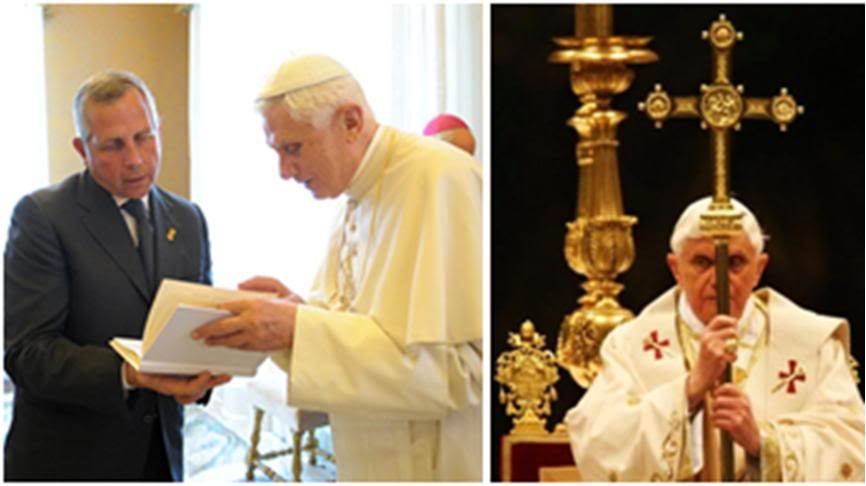 The Pope with the present president of the Circolo San Pietro, Duke Leopoldo Torlonia; right photo, shown with the new staff which was a gift from the Circolo; below, the Circolo members with the Pope in last year's audience.
The Pope with the present president of the Circolo San Pietro, Duke Leopoldo Torlonia; right photo, shown with the new staff which was a gift from the Circolo; below, the Circolo members with the Pope in last year's audience.
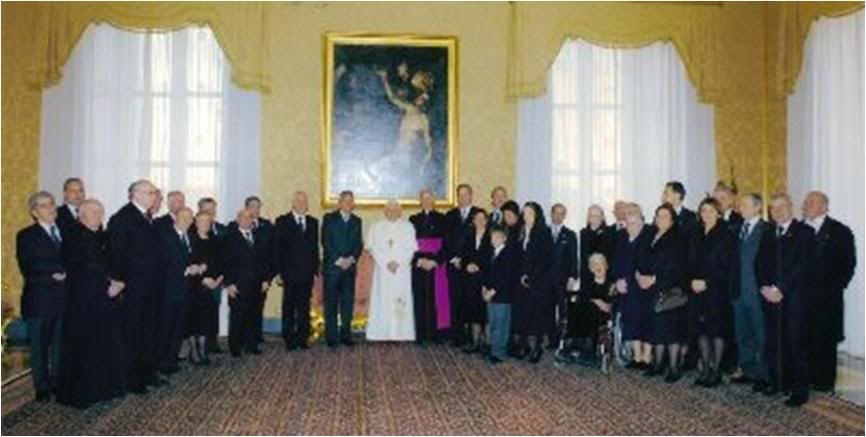 The Holy See helps the poor
The Holy See helps the poor
of Rome and the world
In his audience with the members of the Circolo San Pietro Saturday, Benedict XVI said their 'generous work' is a concrete sign of the Pope's charitable activity and the Holy See's solidarity with the poor of Rome and the world.
Here is a full translation of his address:
Dear members of the Circolo San Pietro:
I am happy to welcome you on this occasion which enables me to renew my gratitude for your generous work in the service of the Holy See.
Our meeting takes place near the liturgical Solemnity of Saints Peter and Paul, and allows us, in some way, to have a foretaste of the joy of the observance which is very significant for your praiseworthy sodality and for the entire Church.
I greet each one with affection, starting with your president, Duke Leopoldo Torlonia, whom I thank for the kind words he addressed in the name of everyone, and also your spiritual adviser.
We recently concluded the Year for Priests, which was a time of grace, during which the Church reflected with special attention on the figure of St. Jean Marie Vianney, the Holy Curate of Ars, on the 150th anniversary of his death.
He is a model of evangelical living not just for priests, but for laymen too, especially for those like you who are involved in the vast field of charity. A particular aspect of the life of this humble priest was, in fact, his detachment from material goods. He possessed nothing, and distributed all he had to the neediest. For himself, he did not feel he needed anything - he considered everything material to be superfluous.
He had learned to care for the poor as a boy, seeing how his parents welcomed them to their home and helped them. This love led him, when he was a priest, to give everything he had to the needy. He even set up a hospitality home, which he called 'Providence', for poor girls, to whom he tried to assure a Christian education.
May his example be for you, dear members of the Circolo San Pietro, a constant invitation to open wide your arms to every person who needs a tangible sign of solidarity.
Continue to be the concrete sign of the Pope's charity toward those who are in need, both in the material and spiritual senses, as well as to all the pilgrims who come to Rome from all over the world to visit the tombs of the Apostles and to meet the Successor of Peter.
As we were reminded earlier, you are here today to consign to me the collection for Peter's Pence this year from the churches of Rome. I wish to express my gratitude for this attestation of participation in my concern for the neediest persons.
This represents a point of convergence of two complementary actions that become a single eloquent testimonial of evangelical charity, because on the one hand, it manifests the affection of the inhabitants of this city and of pilgrims to Rome for the Successor of Peter, and on the other hand, it expresses the concrete solidarity of the Holy See towards so many situations of need and indigency that unfortunately persist in Rome and other parts of the world.
Getting close to the parishes of Rome and managing assistance and hospitality centers in the capital, you have the possibility of grasping directly the multiple situations of poverty that the city continues to have.
At the same time, you can also observe the intense desire in people to know Christ and to love him in their brothers.
Through this commitment of yours to respond directly to the needs of the less fortunate, you spread a message of hope, which comes from faith and adherence to the Lord, thus becoming heralds of his Gospel.
May charity and witness continue to be the guidelines of your apostolate. I encourage you to continue your activities with joy, inspiring yourselves incessantly with indefectible Christian principles and always drawing new vigor from prayer and the spirit of sacrifice - as your motto says - in order to bring copious fruits of good to the Christian community as well as to civilian society.
I entrust your aspirations, your plans and every activity to the maternal protection of the Blessed Virgin, Salus Populi Romani, so she may guide your steps and make you ever more convincing workers for solidarity and builders of the peace in all the fields where your praiseworthy activity is carried out.
With these wishes, I invoke the heavenly intercession of Saints Peter and Paul, and I gladly impart to each of you, to your families, and those whom you encounter in your daily service, a special Apostolic Blessing.
 Peter's Pence collection
Peter's Pence collection
worldwide this weekend
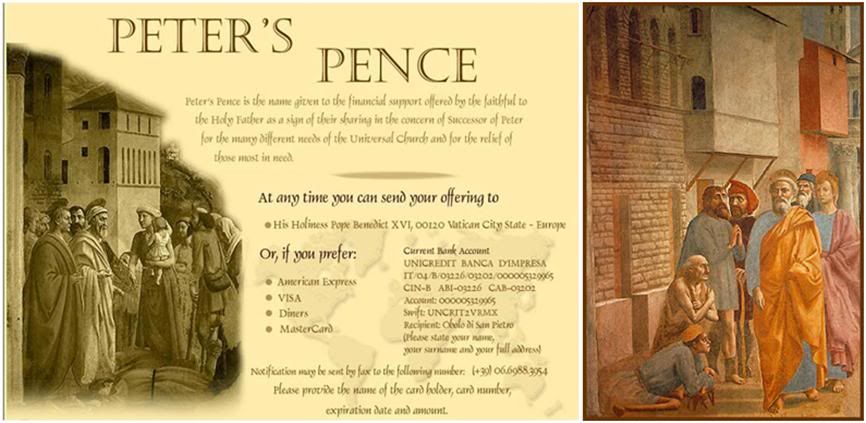
The Peter’s Pence Collection will be taken up in most Catholic parishes the weekend of June 26 - 27. This year’s theme, “Cast the love of Christ upon the world,” focuses on the relationship between solidarity and love.
The theme draws from Pope Benedict’s encyclical letter Caritas in Veritate (no. 78) where he says, “God’s love . . . gives us the courage to continue seeking and working for the benefit of all.”
Through this worldwide collection the Pope is able to exercise the ministry of charity on behalf of the entire Church. Offerings to the collection support church needs, humanitarian initiatives (such as aid of victims of war, oppression and natural disasters) and other human promotion projects around the world.
Assistance to seminaries and institutes of Christian formation in many developing countries, a village for HIV/AIDS orphans in Kenya, and the establishment of the Hospital of St. Vincent de Paul in Bosnia are examples of assistance provided by the Pope thanks to the generosity of parishioners.
Other works which have recently received assistance through the Peter’s Pence Collection include the Nazareth Boys Town in Mbare, Rwanda, that takes in abandoned orphans who are victims of genocide and civil war, and Casa di Accoglienza Giovanni Paolo II (Opera Don Orione) [visited Thursday by Benedict XVI], a residence that gives free shelter and specializes in helping special-needs pilgrims to travel to Rome.

[Modificato da TERESA BENEDETTA 27/06/2010 08:04] |
| |
 27/06/2010 05:12 27/06/2010 05:12 |
|
| | | OFFLINE | | Post: 20.471
Post: 3.109 | Registrato il: 28/08/2005
Registrato il: 20/01/2009 | Administratore | Utente Master | |
|
 So my initial outrage yesterday on reading about the police raids on the properties of the Archdiocese of Mechelen-Brussels was not uninformed, after all, that even Communist-era raids could not have been as bad!... BTW, still no outrage from Anglophone liberals!
Cardinal Bertone says manner
So my initial outrage yesterday on reading about the police raids on the properties of the Archdiocese of Mechelen-Brussels was not uninformed, after all, that even Communist-era raids could not have been as bad!... BTW, still no outrage from Anglophone liberals!
Cardinal Bertone says manner
of Belgian raids unheard of
even in Communist regimes
Translated from

July 27, 2010
ROME - "The sequestration was a serious event, unheard of", said Cardinal Tarcisio Bertone, Secretary of State, commenting personally on the raid-and-search operations carried out by Belgian police in the Archdiocese of Machelen-Brussels on Thursday.
 From left: St. Rombout's, the cathedral of Mechelen; police stand guard outside; other police have sniffing dogs; police guard outside the Archbishop's Palace during the ten-hour raid.
[Police entered the Archbishop's Palace around 10:30 a.m. as a meeting of the Belgian bishops' conference was getting under way. The bishops were detained, and their cell phones confiscated, until the police finished their search almost ten hours later. They also raided the office of a lay commission investigating complaints of sex abuse victims and took away all the confidential files, and they drilled into the tombs of two Brussels archbishops in the crypt of Mechelen Cathedral searching for hidden files. Apparently, all of that is legal in Belgium. How's that for a country that swaggers about its 'advanced state of enlightened secularism'?]
From left: St. Rombout's, the cathedral of Mechelen; police stand guard outside; other police have sniffing dogs; police guard outside the Archbishop's Palace during the ten-hour raid.
[Police entered the Archbishop's Palace around 10:30 a.m. as a meeting of the Belgian bishops' conference was getting under way. The bishops were detained, and their cell phones confiscated, until the police finished their search almost ten hours later. They also raided the office of a lay commission investigating complaints of sex abuse victims and took away all the confidential files, and they drilled into the tombs of two Brussels archbishops in the crypt of Mechelen Cathedral searching for hidden files. Apparently, all of that is legal in Belgium. How's that for a country that swaggers about its 'advanced state of enlightened secularism'?]
"There are no precedents for this, not even under the Communist regimes", Bertone noted. He reiterated the Church's 'condemnation of pedophilia' but it was another matter "to detain the bishops for more than nine hours without allowing them to drink or eat".
Bertone spoke to newsmen at an international symposium of university professors at which he was a speaker.
He also commented on an ongoing industrial dispute, expressing the hope that the crisis at the Fiat plant in Pomigliano d'Arco could be resolved soon "with decisions in favor of the families, the workers and their total integral development".
Typically, Avvenire, the Italian bishops' newspaper, promptly published a strong editorial about the raids. And just as typically, Vian's Osservatore Romano did not, contenting itself with the brief comments made by Cardinal Bertone above :
An outrage that achieved nothing
- and reveals a lot about
Belgian authorities
by Marina Corradi
Translated from

July 26, 2010
A blitz in the crypt of a cathedral as if it were the heart of a criminal organization. To drill into the tombs of two cardinals, violate their resting place in search of secret dossiers - and of course, they found nothing. What happened in Mechelen on Thursday sounds like a Dan Brown film.
In the course of an investigation on complaints of pedophile crimes committed by some Belgian priests, a Belgian judge ordered bishops to be interrogated, files to be confiscated, and even the raid-and-search on the crypt of the 12th century cathedral, symbol of Brussels's twin city.
The legality of the investigation is not in question here, nor the need to arrive at the truth, to establish if crimes were committed and by whom. For months, the Pope has been calling for amends to make things right, to grant some justice and appropriate care to the victims.
But in the Thursday blitz and violation of the cardinals' tombs, we can read something that goes beyond the legitimate demands of justice.
Was it really necessary, as some even in the Belgian media have asked, to use pneumatic drills on the cardinals' tombs? In fact, does this assault not take on a symbolic value - clearly the wish to attack the Church in its entirety?
"Operation Church" is the name the Belgian prosecutors have given to their investigation, and it is significant. Because it clearly names the target. Not the individual offenders but 'the' Church.
The Operation is not really about the terrible and odious crimes committed by some of its ministers, but for what the Church itself represents, for what the Church is. In the attack on the tombs, one sees a redde rationem, a secular settling of accounts with the Church which continues to bring Christ to the world, Christ and his truth.
This, of course, especially in a secularized nation like Belgium, clashes openly with the dominant culture and its idol - the coddled 'I', free of every law that is not its own.
One cannot otherwise explain the brutality and the intended high visibility of the raids. The intention was to strike at the heart.
Churches have been assaulted through the centuries with other kinds of destruction. But in revolutions and tragedies that cannot be compared with this mini-blitz ordered by a municipal judge - a legal incursion, protected by search orders.
Nonetheless, to violate the tombs of long dead cardinals inside a cathedral - despite the chrism of the law on that search warrant - is exactly what it is, a violence.
Taking advantage of the tragic circumstances regarding pedophile abuses, the actions were meant to strike not at the culprits for those abuses, but at the Church itself.At the very heart and guts of one of the most resplendent cathedrals in Europe.
From a bird's-eye view, it appears like the center of a fine spider's web of homes, and stories, and men. Its colossal marble columns seem like the roots of the city, a sign in stone of the medieval Europeans coming together in communities and cities.
And that is why we feel the pain of this petty blitz unleashed by some unknown judge in a small city far from us. It was a way of telling the faithful that their common heart could well be the repository of shameful secrets. That had to be drilled through, inspected by digital cameras to seek these secrets out.
Even if they found nothing, the sense of their profanation remains, and even perhaps, the doubts they have sown - exactly as though they wished to poison the roots of the city and its people.
[Modificato da TERESA BENEDETTA 28/06/2010 12:51] |
| |
 27/06/2010 16:53 27/06/2010 16:53 |
|
| | | OFFLINE | | Post: 20.472
Post: 3.110 | Registrato il: 28/08/2005
Registrato il: 20/01/2009 | Administratore | Utente Master | |
|
 The unwarranted 'muscle of Brussels' exhibited by Belgian police last Thursday has drawn a personal reaction from the Holy Father himself - and sad to say, whereas the Anglophone MSM had almost virtually ignored the story earlier and the implications of that show of force, now they are all over it because the Pope has reacted, but the tenor of reporting is not that there was anything objectionable in the way the Belgian police carried out what they did but that the Vatican appears to be protesting investigation of the sex abuse claims itself!
Pope says Brussels raids
The unwarranted 'muscle of Brussels' exhibited by Belgian police last Thursday has drawn a personal reaction from the Holy Father himself - and sad to say, whereas the Anglophone MSM had almost virtually ignored the story earlier and the implications of that show of force, now they are all over it because the Pope has reacted, but the tenor of reporting is not that there was anything objectionable in the way the Belgian police carried out what they did but that the Vatican appears to be protesting investigation of the sex abuse claims itself!
Pope says Brussels raids
were carried out in
'surprising and deplorable ways'
Translated from

June 27, 2010
In an unusual Sunday bulletin, the Vatican today released the text of a letter from Pope Benedict XVI to the Primate of Belgium, expressing his sadness over the events on Thursday in Brussels's twin city of Mechelen (Malines).
The following is a translation of the French original:
To my dear Brother,
Mgr André Joseph Léonard,
Archbishop of Mechelen (Malines)-Brussels
President of the Belgian Episcopal Conference
I wish to express to you, dear brother in the Episcopate, and to all the Bishops of Belgium, my closeness and my solidarity in this moment of sadness after raids were carried out, in surprising and deplorable ways, in the Cathedral of Mechelen and in the building where the Belgian episcopate was holding a plenary meeting.
This meeting was supposed to deal, among other things, with aspects regarding the abuse of minors by some members of the clergy. I have myself reiterated many times that these serious cases must be dealt with by civilian and canonical authorities, with reciprocal respect for the specific duties and authonomy of both sides.
In this sense, I hope that justice will take its course while guaranteeing the right of persons and institutions, respect of the victims, and the unprejudiced recognition of those who are committed to work with the system, while rejecting all that could obscure the noble duties that are assigned to each side.
With assurances that I follow the course of the Church in Belgium everyday with prayer, I gladly send you an affectionate Apostlic Blessing.
Vatican City
June 27, 2010 [/DIM}

Belgian newspapers
fan the flames
against the Church
Translated from

June 27, 2010
The court-ordered raids in the Archdiocese of Mechelen-Brussels on Thursday were front-page news in Belgian newspapers yesterday.
Most of them, while finding some aspects of the raid 'disporportionate', nonetheless defended the court-ordered actions.
The Dutch-language De Standaard published a photomontage of the book covers from Dan Brown's novels against a portrait of Cardinal Godfreed Danneels, who was Primate of Belgium for 30 years until his recent retirement. [Implying, I suppose, that he is as villainous as Dan Brown's arch-villainous Catholic prelates! But wasn't he the liberal darling for three decades? Suddenly, he's a villain to them???? Why don't they sensibly investigate what, if any, were his failures and shortcomings in dealing with sex abuse cases involving his priests and bishops????]
The Flemish-language De Morgen used inflammatory language, summarizing its take on the raids by the obviously wrong accusation, "Rome excommunicates justice" [which is not borne out by any facts at all! [*****!(cuss-words) The Belgian authorities did all the aggression, and Rome is the culprit?]
In the French-language newspapers: Le Soir's headline was "Belgian justice makes the Roman Church tremble"; and in Le Libre Belgique, "Rupture between the Church and Belgian justice".
Clearly, the Belgian media anticipated the MSM line taken today following the Pope's statement - that the Church is protesting the civilian investigation itself of sex crimes by priests, when clearly everyone has been clear from the start that the protest is against the unwarranted aggression of the Thursday raids.
This is MSM's new point of attack - no matter how obviously false, fallacious and indefensible - against the Church.
[Modificato da TERESA BENEDETTA 27/06/2010 19:02] |
| |
 27/06/2010 18:17 27/06/2010 18:17 |
|
| | | OFFLINE | | Post: 20.473
Post: 3.111 | Registrato il: 28/08/2005
Registrato il: 20/01/2009 | Administratore | Utente Master | |
|
 June 27, 13th Sunday in Ordinary Time
June 27, 13th Sunday in Ordinary Time
 Center icon: In orthodox iconography, Cyril is often paired with Athanasius (left), his great predecessor as Bishop of Alexandria.
ST. CYRIL OF ALEXANDRIA (Egypt, 376-444), Bishop, Theologian, Doctor of the Church
Center icon: In orthodox iconography, Cyril is often paired with Athanasius (left), his great predecessor as Bishop of Alexandria.
ST. CYRIL OF ALEXANDRIA (Egypt, 376-444), Bishop, Theologian, Doctor of the Church
Benedict XVI devoted his catechesis on October 3, 2007, to Cyril of Alexandria
www.vatican.va/holy_father/benedict_xvi/audiences/2007/documents/hf_ben-xvi_aud_20071003...
who was made a Doctor of the Church by Leo XIII and who has been called 'Pillar of Faith' and 'Seal of the Fathers' because of his staunch doctrinal orthodoxy. He grew up under an uncle, Theophilus, who was bishop of Alexandria and who took him to Constantinople where eventually, he took part in a Synod that deposed John Chrysostom as Bishop of Constantinople, in the context of an ongoing rivalry between Constantinople and Alexandria (along with Rome, Jerusalem and Antioch, they made up the premier Sees of the early Church). When Theophilus died, Cyril was elected to succeed him and served as Bishop of Alexandria for 32 years. He was responsible for closing down the churches of Novatian heretics, and for expelling anti-Christian Jews from Alexandria and confiscating their properties. His biggest conflict was with Nestorius, elected Bishop of Constantinople in 418 who affirmed that Jesus was only a vessel in whom God dwelt and therefore refused to call Mary Theotokos (or God-bearer). Cyril spearheaded a theological campaign against this heresy to affirm the traditional teaching that human and divine nature united uniquely in Jesus. Significantly, Benedict XVI chooses this quotation from a letter that Cyril wrote to Nestorius: "It is essential to explain the teaching and interpretation of the faith to the people in the most irreproachable way, and to remember that those who cause scandal even to only one of the little ones who believe in Christ will be subjected to an unbearable punishment". Benedict goes on to say that "the faith of the people is an extension of tradition and a guarantee of sound doctrine". Cyril and his supporters held the Council of Ephesus in 431 which affirmed traditional Church teaching on Christ and the Theotokos, condemned Nestorius, and exiled him. Cyril was a prolific writer who was widely read in his day. His theology was very Christ-centered and much of it carried on the ideas of his great predecessor Athanasius (285-373), not surprisingly known as the Doctor of Orthodoxy, whose great fight was against the Arian heresy.
Readings for today's Mass:
www.usccb.org/nab/readings/062710.shtml
OR today.
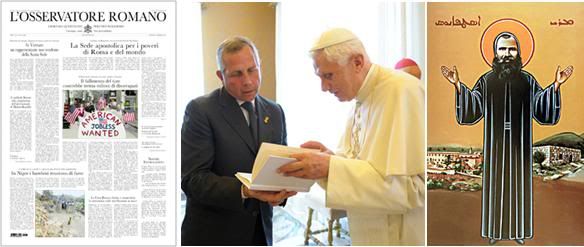 Right photo: Blessed Stephano Nehme, Maronite monk, Lebanon (1889-1938)
Right photo: Blessed Stephano Nehme, Maronite monk, Lebanon (1889-1938)
Benedict XVI's audience with the Circolo San Pietro:
'The Apostolic See for the poor of Rome and the world'
Two other Vatican stories on Page 1: The Vatican will name a non-resident representative to Vietnam; and Cardinal Bertone criticizes the manner of the Belgian police raids in teh Archdiocese of Mechelen-Brussels last Thursday. Page 1 international news: The International Monetary Fund warns the G20 nations that unless they take the right fiscal measures, they face an unemployment number of 30 million; Obama chooses to defy a court order striking down his 6-month moratorium on deep-sea drilling which can cause a monthly loss of $350 million in revenues and lead tens of thousands of Americans in the Gulf states to be unpaid during the moratorium; and half of Niger's population at risk due to drought and famine. Inside, there is a story on Stephano Nehme, the Maronite monk beatified in ceremonies today held in Kfifane, Lebanon.
THE POPE'S DAY
Sunday Angelus - The Pope returned to the mission of priests in his mini-homily on today's Gospel,
pays homage to the new Blessed, Stephano Nehme of Lebanon, and expressed his thanks for worldwide
contributions to Peter's Pence. He reminded Italian pilgrims to use the coming summer vacation not only
for physical and intellectual refreshment, but also by more intimate contact with God.
The Vatican released the text of a letter written by the Holy Father to Mons. Andre Leonard, Archbishop of
Mechelen-Brussels, regarding the Belgian police raids on the Archdiocese last Thursday. (See post above).
[Modificato da TERESA BENEDETTA 28/06/2010 02:03] |
| |
 27/06/2010 20:25 27/06/2010 20:25 |
|
| | | OFFLINE | | Post: 20.474
Post: 3.112 | Registrato il: 28/08/2005
Registrato il: 20/01/2009 | Administratore | Utente Master | |
|

 Here's a 'lip-smacking' commmentary on the Belgian raids...
The actions of lawmen
Here's a 'lip-smacking' commmentary on the Belgian raids...
The actions of lawmen
in a secularized country
without a government
by VITTORIO MESSORI
Translated from

June 27, 2010
Good news for the Catholic church from Belgium. Good news? Yes, perhaps, at least from the perspective of Realpolitik. That is, even those who are trying to do right can easily pass, if they exaggerate, over to the side of wrong. Also, as the saying goes, ridicule can be more harmful than the sword.
Let us start with the exaggeration - I am not sure if it was grotesque or ignoble - by Belgian magistrates who sent a police brigade to detain the entire bishops' conference who were holding a plenary session. The policemen confiscated all their telephones and prevented them from communicating at all with the outside world.
What were they trying to prevent? That some bishop might call the Vatican and ask to be rescued by the Swiss Guards 'By the paratroop division, please'???
Or that they might call on some monsignor who might be engaged in some unspeakable activity to get dressed and dismiss his minor partner right away as he risked being raided by the secular morality police?
Or that they might call their 'accomplices' in their respective dioceses to destroy every document that could possibly refer to sex crimes - even if all such records have already been run through with a fine-tooth comb by Belgian religious as well as state authorities?
Then there was the vaudeville act by the police colonel who led the raid he had to consult his superiors when the Apostolic Nuncio to Belgium, who was present at the bishops' meeting, presented his diplomatic passport. And his superiors in turn had to consult some minister - a virtual one, since Belgium for the moment has no government [i.e., it is between governments so it has no functioning cabinet). Eventually, much to the colonels' regret, he had to allow the Nuncio to leave - with his cellphone, too.
Also quite astute - and probably very fruitful! - was the immediate move by the police technicians to lift the hard drive from Cardinal Danneels's old computer, as, you never know, he might have kept on it any and all compromising messages and photographs, including perhaps affectionate exchanges with young men 'hooked' via Facebook!
But the most devastatingly ridiculous decision of the authors of the police raids was the assault on the tombs of two cardinal archbishops in the crypt of the splendid millennial cathedral of Mechelen (Malines) which by ancient privlege, continues to be the religious metropolis of the country.
Not just Dan Brown but even Umberto Eco might be inspired by the episode to add a chapter to a new edition of The pendulum of Foucault. Which, as those who have read Eco's novel know, is among other things, a mocking send-off of personages like these Belgian judges who are obsessed with enigmas, mysteries, secret codes: always and only Catholic, of course.
The policemen, obviously trusting their superiors, gladly went along with their orders, these being, in effect: "Go to the old catehdral, descend into the dark crypt, open the venerated tombs of the cardinals, and there you will find the parchments documenting the evil conspiracy of the bishops and priests today, who are practitioners of pederast cults just as much as their predecessors, the Knights Templar, were!"
Indeed, as everyone should know, the fastest and surest way of hiding embarrassing and inculpating files is to get a team of skilled workers, make them work on these ancient artistic sarcophagi and use special apparatus to lift the heavy stone lids without damaging them, and then before replacing the lid, to fill the tomb with documents on the obscene rites carried on by Belgian prelates and priests.
And all at night, of course, since the Cathedral at Mechelen is one of the most visited churches in Belgium not just by the faithful but by tourists who would be suspicious if they saw masons and machinists working on the tombs!
But what to do then about these workers ordered to do the dirty job? We know that the ancient Egyptians, once the labyrinth leading to the burial chamber of the pyramid had been completed and closed off, then proceeded to the ritual beheading of all those who knew the secret since they had worked on it.
But let us not say it aloud, lest the Belgians take us seriously and order next the investigation of a possible massacre of masons ordered by the Primate of Belgium!
In any case, beyond such black humor: the problem of sexual abuse of minors is too serious to be left to investigators like these.
The Secretary of State has done his duty protesting the manner of the raids, but raised a comparison with Russian Bolsheviks, who, like the Spanish anarchists of the Civil War, did terrible and ferocious things.
But one might make the comparison with some evident but forgotten facts about a Belgium which boasts of being one of the most secularized nations on earth - where the marginalization of Catholics has been growing daily.
The state of Belgium was born in 1830 with the free union of Walloons and Flemish - they spoke different languages, and had different traditions and histories, but they were united by their common Catholicism which was solid and fervent.
Thus, they would not support being subjected to being persecuted by Dutch Calvinism. The union lasted until the nation acknowledged that it was Catholic. And now, that one glue has dissolved, and Belgium has become an ungovernable fiction.
Perhaps, operations like Thursday's raids confirm the confusion of a State which for years has been unable to have a credible government, and which, at least among the so-called intelligentsia, appears to be united now only by aversion to the Roman Catholic Church.
Il Foglio has an equally informative but more straightforward commentary, with a rather shocking and very relevant ending which says all there is to say about the despicable hypocrisy of Belgium's secular society:
Belgium hardly 'exists' anymore
but what there is of it is certainly
most efficient in hunting priests down!
Editorial
Translated from

June 27, 2010
BRUSSELS - In Belgium - a country without a nation, eternally divided between the Flemish and the Francophones, a hybrid of Catholicism and Freemasonry, where Prime Ministers fall every six months and they need months and months to form a government - the Church is undergoing maltreatment 'worthy of the Da Vinci Code," said Mons. Andre Leonard, Primate of Belgium.
Because of the wave of complaints about sexual abuse against minors by priests, "justice should do its work," Leonard said. "Nonetheless I was stunned that they went as far as to look inside the archbishops' tombs and that all of us bishops were sequestered for more than nine hours".
The Vatican Scretariat of State has expressed 'indignation' for the way the raids were carried out. But Belgium, which is divided on everything else, appears unanimous in hunting down pedophile priests in an operation the authorities have called 'Operation Church'.
On Thursday, all the Belgian bishops were interrogated from morning till early evening by investigating magistrates and their co-workers. Court police aearched the offices of the Archdiocese of Mechelen-Brussels; the home of former Primate, Cardinal Godfried Danneels; and the hedquarters of the lay commission set up by the Belgian Church to investigate all complaints of sexual abuse against priests.
At least one tomb in St. Rombout Cathedral was destroyed when the raiders used a pneumatic drill on it in search of any 'smoking gun': a document, a letter, anything to show the 'delinquent association' or at least the 'complicity' of the Belgian Church in covering up priestly abuses against minors, according to the investigating judge, Wim de Troy. One source reportedly informed the court of a secret hiding place in the Archbishop's Palace.
The police left with 475 files, which were by no means hidden, but about which, according to a previous agreement between the Church ahd the Justice Minister in the previous government, any files pertaining to complaints presented to the Commission on Sexual Abuses, should remain confidential.
Mons. Leonard was named Primate of Belgium following the wave of pedophile 'scandals' widely publicized in other countries, and immediately promised a 'zero tolerance' policy.
In April, the Bishop of Bruges, Roger Vangheluwe, Belgium's longest-serving bishop, resigned after admitting that he had improper relations with a young male parishioner that continued even after he was named bishop.
The former Primate of Belgium, well-known progressivist Cardinal Godfried Danneels, whom like-minded bishops would have elected Pope, was accused of having covered up for Vangheluwe.
Considered 'fundamentalist' by the Belgian media because he opposes, abortion, euthanasia and gay marriage, Mons. Leonard responded to the Vangheluwe case by calling on all possible victims of clerical sex abuse to present their complaints to a commission presided by a layman, Peter Adriaenssens, to whom the then Justice Minister Stefaan de Clerck gave guarantees that he could work independently and confidentially.
Now, after the June 12 elections, De Clerck denies everything, claiming that the procesutors are not 'bound' by that agreement.
"Some magistrates, particularly De Troy", wrote Le Soir, "have shattered the illusions of the clergy, reminding them that justice for human beings has nothing to do with canon law nor with any privleges claimed by the clergy".
But even the sometimes pro-Catholic Le Libre Belgique is calling for the prosecutors to 'pursue these cases in depth and to the very end', or else "The Catholic Church in Belgium will remain a prisoner of suspicion".
The same tone from the political class, both Flemish (traditionally Catholic) and Francophone (predominantly Masonic).
"Whoever has committed abuses should be prosecuted and condemned according to Belgian Law", said the outgoing Prime Minister Yves Leterme, a Flemish Christian Democrat. "The investigations prove that Church and State have separate powers in Belgium". [But no one in the Church questions all that! The investigations are not being questioned at all - just the manner in which the Thursday raids were conducted!]
The case of Mark Dutroux - a pedophile scandal [not involving priests] that shook Belgium in the mid-1990s - partly explains the phobia for pedophile priests. For some observers, the present 'hounding' of the Church is a way for the Belgian political class and courts to clean their consciences about the Dutroux case.
Initial investigations had uncovered a pedophile network that involved high-ranking personages in the country - and then came to a sudden stop when it appeared to touch even the man who is now King Albert II... And very quickly, the Belgian establishment transformed the investigating judges and the victims from heroes into megalomaniacs who should not be given any credence at all!
Do not forget Belgium is the country whose Parliament passed a resolution condemning Benedict XVI because of what he said about condoms and AIDS last year! St.Damien of Molokai, invoke good sense and Christian enlightenment for your compatriots!
[Modificato da TERESA BENEDETTA 28/06/2010 12:47] |
| |
 27/06/2010 23:12 27/06/2010 23:12 |
|
| | | OFFLINE | | Post: 20.475
Post: 3.113 | Registrato il: 28/08/2005
Registrato il: 20/01/2009 | Administratore | Utente Master | |
|
 ANGELUS TODAY
ANGELUS TODAY
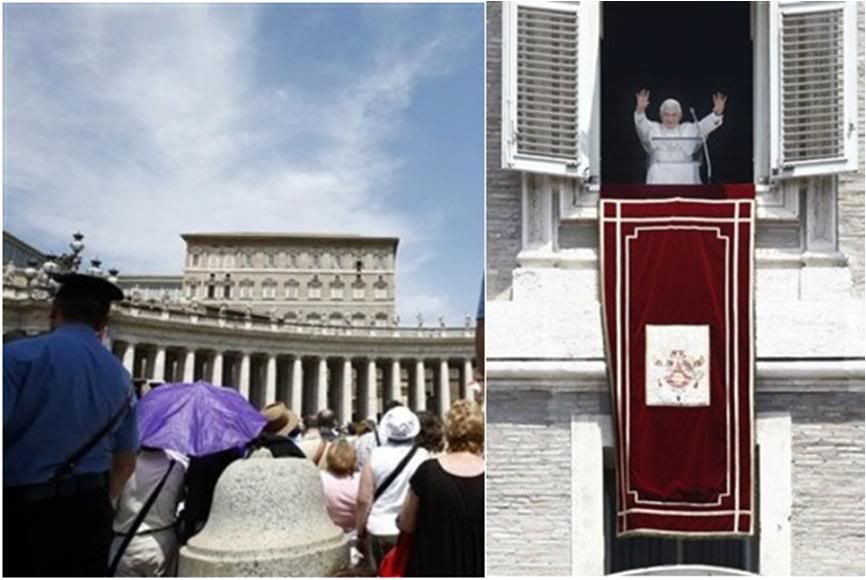
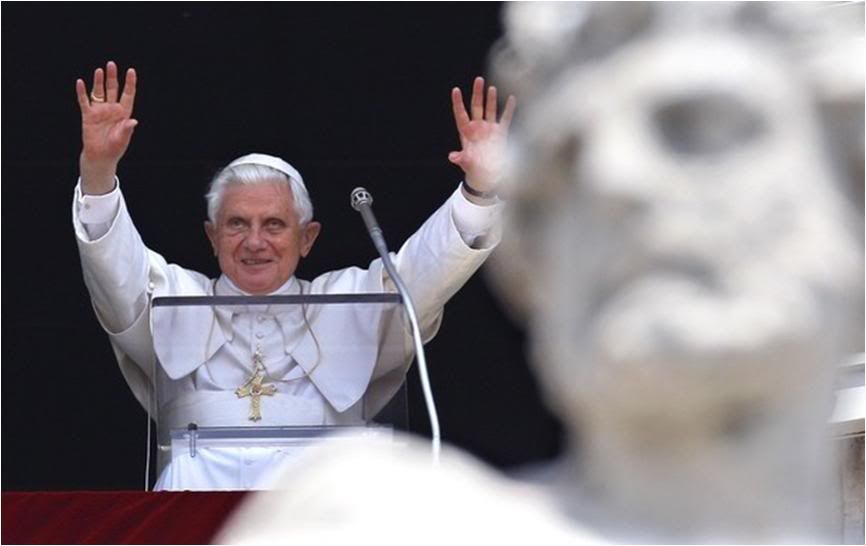
The Holy Father returned to talk once again about the mission of priests in his mini-homily on today's Gospel, paid homage to the new Blessed, Stephan Nehme of Lebanon, and expressed his thanks for worldwide contributions to Peter's Pence.
He also reminded the faithful to use the coming summer vacation not only for physical and intellectual refreshment, but also by more intimate contact with God.
In English, he said:
On Tuesday of this week we will be celebrating Rome’s feast-day, that is to say, the feast of Saints Peter and Paul – two great Apostles who proclaimed the Gospel in this city and bore witness to Christ even to the shedding of their blood.
Through their prayers, may all who come on pilgrimage to Rome be renewed and strengthened in faith, hope and love. May God’s abundant blessings come down upon all of you and upon your loved ones at home!
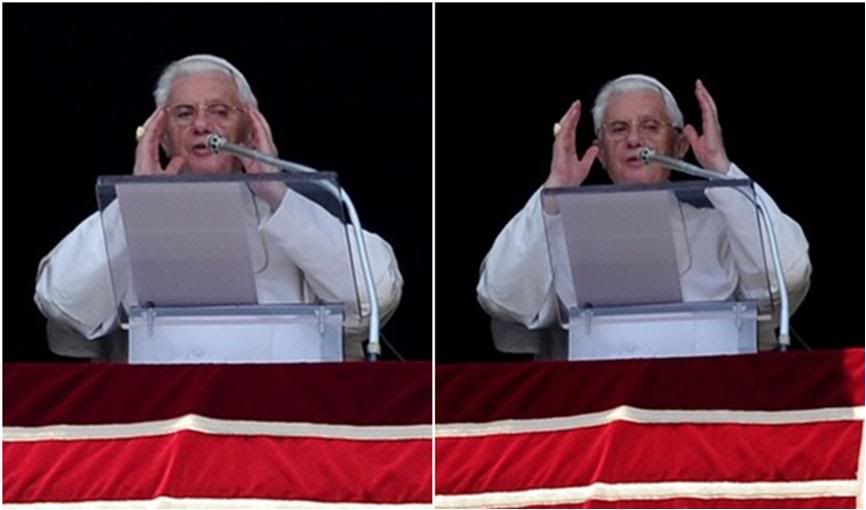
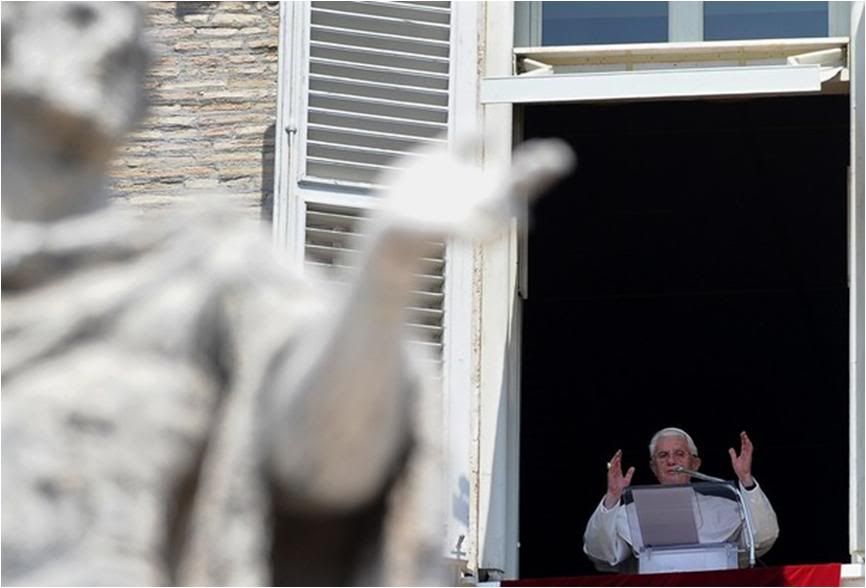
Here is a full translation of what the Holy Father said today:
Dear brothers and sisters!
The Biblical readings for the Holy Mass this Sunday give me the opportunity to take up once more the subject of Christ's call and its demands, a subject I dwelt on last week at the ordination of new priests for the Diocese of Rome.
Indeed, whoever has the good fortune to know a young man or a young woman who leaves family, studies or work to be consecrated to God knows well what this is about, because he has before him a living example of a radical response to divine calling.
This is one of the most beautiful experiences one can have in the Church: to see, to touch, the action of the Lord on the lives of persons, to experience that God is not an abstract entity, but a Reality so great and srong that can fill man's heart so super-abundantly, a living Person who is near, who loves us and asks to be loved.
(In today's Gospel), the evangelist Luke presents Jesus to us while he is walking on the road that leads to Jerusalem. He meets some people, probably young people, who promise to follow him wherever he goes.
But he shows them that he would be very demanding, warning them that "The Son of Man (i.e., him, the Messiah) has nowhere to lay his head on" - he has no stable residence of his own - and that whoever chooses to work with him in God's field cannot then pull back (cfr Lk 9,57-58.61-62). To someone else, Jesus says: "Follow me!", asking him to make a clean break with his familial ties (cfr Lk 9,59-60).
These demands may appear too harsh, but in fact, they represent the newness and the absolute priority of the Kingdom of God which is present in the person of Jesus Christ himself. Ultimately, this is about that radicalness owed to the Love of God, whom Jesus himself obeyed.
Whoever renounces everything, including himself, in order to follow Jesus, enters a new dimension of freedom, which St. Paul defines as "walking according to the Spirit" (cfr Gal 5,16).
"Christ has liberated us for freedom", the Apostle writes, and he explains that this new form of freedom acquired for us by Christ consists in being "at the service of one another" (Gal 561,13).
Freedom and love coincide! Whereas, obeying one's own selfishness leads to rivalry and conflicts.
Dear friends, the month of June is coming to an end, a month that was characterized by devotion to the Sacred Heart of Jesus. On the Feast of the Sacred itself, we renewed with the priests of the whole world our commitment to sanctification. Today, I wish to invite everyone to contemplate the mystery of the divine-human Heart of our Lord Jesus, in order to draw directly from the source of God's love itself.
Whoever fixes his gaze on that pierced Heart that is always open with love for us, feels the truth of the invocation: "You are my inheritance, o Lord" (Resp. Psalm), and is ready to leave everything to follow the Lord.
Mary, who responded weithout reservations to the divine call, pray for us!
After the prayers, he said:
Today in Lebanon, Stephan Nehme, born Joseph - a religious of the Lebanese Maronite Order, who lived in Lebanon from the late 19th century to the first half of the 20th - was proclaimed Blessed.
i rejoice from the heart with our Lebanese brothers and sisters, and I entrust them with great affection to the protection of the new Blessed.
On this Sunday which precedes the Solemnity of Saints Peter and Paul, Italy and other countries of the world observe the Day of the Pope's Charity. I express my sincere gratitude to all those who, with prayers and offerings, sustain the apostolic and charitable work of teh Successor of Peter for the good of the Universal Church and for so many brothers both near and far.
In the end, he said:
Vacation time is coming. For many, it will be a time of rest. I hope that encounters with nature, with new persons, and with thw fruits of human creativity, may be an occasion not just to recover physical strength and intellectual development, but also for a more intensive contact with God and a strengthening of faith. God bless you all.
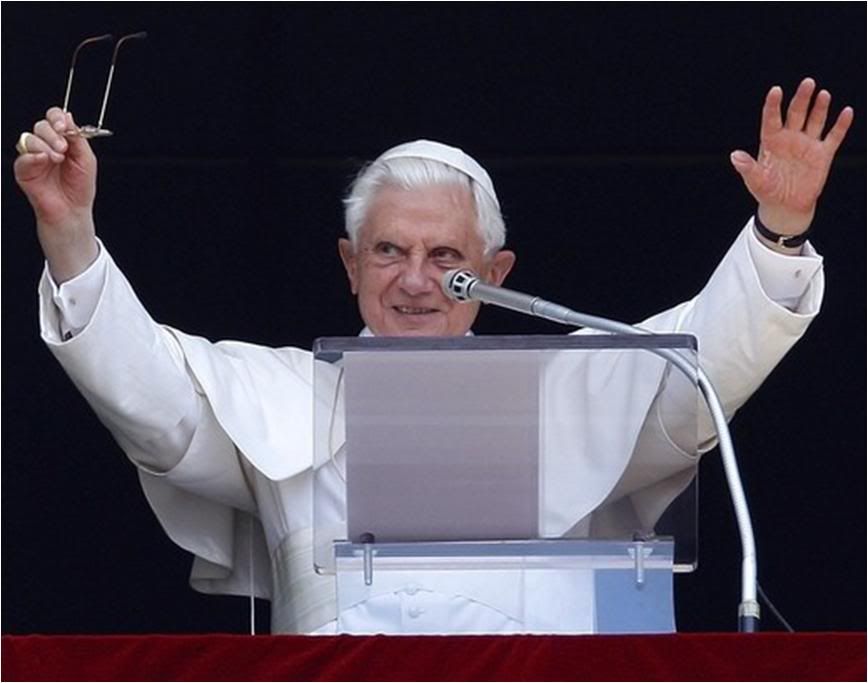
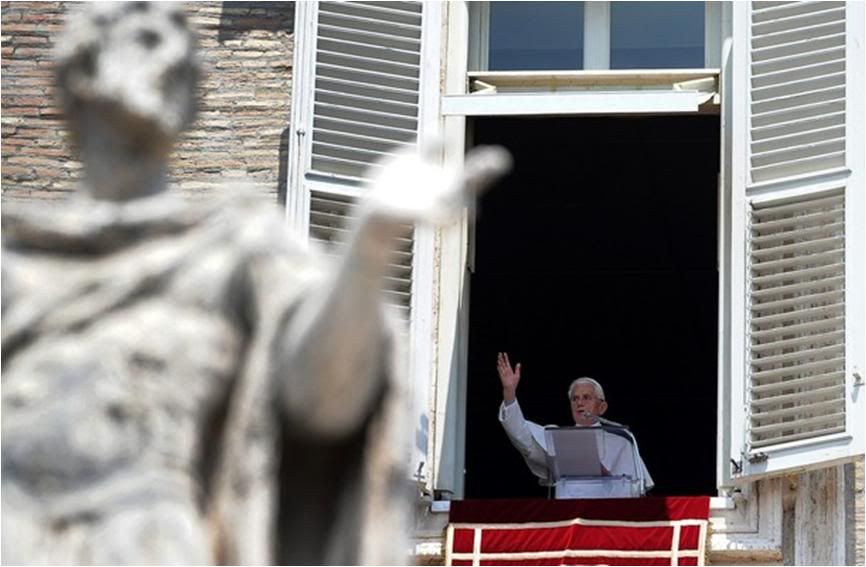
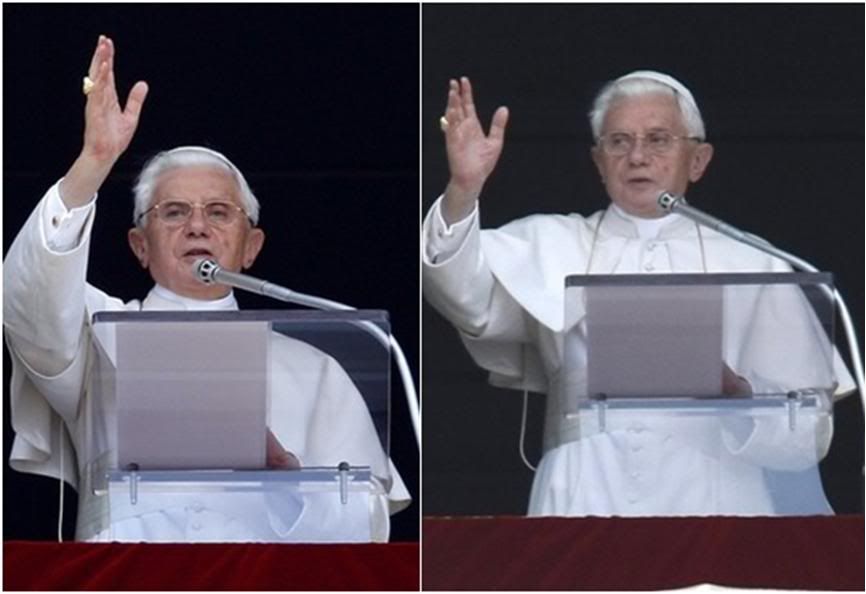
[Modificato da TERESA BENEDETTA 28/06/2010 00:50] |
| |
 28/06/2010 01:20 28/06/2010 01:20 |
|
| | | OFFLINE | | Post: 20.476
Post: 3.114 | Registrato il: 28/08/2005
Registrato il: 20/01/2009 | Administratore | Utente Master | |
|
 The B16 cure for
The B16 cure for
a return to healthy realism

6/24/10
There are three topics that Benedict XVI has been insistent upon these days: the Eucharist, the holiness of priests, and opening reason to the transcendent.
For Papa Ratzinger, they constitute three pillars that define the mission of the Church.
The first has to do with the mission of making Christ present in the world, in a real and concrete way under the form of bread and wine, in the Mass and through the Sacraments, as the Church has always done from its very beginning.
The second has to to do with priests and preparing them for that mission, as ministers and living witnesses to that presence. It was no coincidence that on the eve of the closing of the Year for Priests, when answering a question from a priest, the Pope called celibacy 'a great scandal' to the agnostic mentality because "it demonstrates that God is lived as reality".
The third point, also linked to the first two, is the mission to broaden the rational perspective, to help man go beyond positivistic rationality that is closed to the transcendent, and which as such, is merely an ugly copy of reason.
That is why he devoted three audiences to St. Thomas Aquinas and the harmony between faith and reason which, although they are independent, are linked because they are about the same reality.
This is the vision of religion that Benedict XVI is proposing: not a sentimental elevation nor a system of beliefs in search of an unreachable divinity, but a return to the reality of things:
God is present here and now, under the eyes of everyone. One only has to start by opening those eyes.
|
| |
 28/06/2010 14:00 28/06/2010 14:00 |
|
| | | OFFLINE | | Post: 20.477
Post: 3.115 | Registrato il: 28/08/2005
Registrato il: 20/01/2009 | Administratore | Utente Master | |
|
MEDIA BIAS AT A GLANCE!
A 'snapshot' of Yahoo's listing today of 'Papacy Vatican News' headlines - just the start of it:
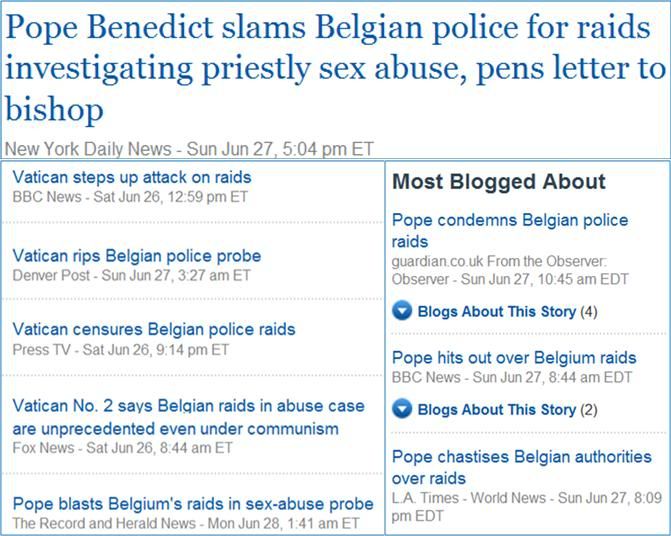
All these headlines - Pope 'slams', 'rips', 'blasts', 'hits out', what-have-you - are based on one sentence in a five-sentence letter from the Pope, and that line said this:
I wish to express to you, dear brother in the Episcopate, and to all the Bishops of Belgium, my closeness and my solidarity in this moment of sadness after raids were carried out, in surprising and deplorable ways, in the Cathedral of Mechelen and in the building where the Belgian episcopate was holding a plenary meeting.
The NY Daily News headline - misleading like all the others are - is almost longer than the relevant words in the Pope's letter! The 'strongest' word the Pope used was 'deplorable' to describe the police raids, but the way the headlines have it, you would think he was showing a disproportionate reaction to the raids rather than that the raids were disproportionate to what they intended to achieve!
I know I shouldn't be surprised but still, a snapshot of MSM headlines is a good way to go on record periodically with these habitual and blatant media misrepresentations of the Pope, without having to post the stories themselves.
[Modificato da TERESA BENEDETTA 28/06/2010 17:07] |
| |
 28/06/2010 15:16 28/06/2010 15:16 |
|
| | | OFFLINE | | Post: 20.478
Post: 3.116 | Registrato il: 28/08/2005
Registrato il: 20/01/2009 | Administratore | Utente Master | |
|
 Monday, June 28, 13th Week in Ordinary Time
Monday, June 28, 13th Week in Ordinary Time
 ST. IRINAEUS OF LYONS (b Asia Minor, ca 140, d Lyons 202), Bishop and Theologian
ST. IRINAEUS OF LYONS (b Asia Minor, ca 140, d Lyons 202), Bishop and Theologian
Benedict XVI dedicated his catechesis on March 28, 2007
www.vatican.va/holy_father/benedict_xvi/audiences/2007/documents/hf_ben-xvi_aud_20070328...
to this early Father of the Church. He was born in Izmir (in present-day Turkey) and had been a student of Bishop Polycarp, who was a disciple of St. John the Evangelist. He eventually moved to Gaul because he was listed among the presbyters of Lyons in 177. That year, he was on a mission to the Pope in Rome when at least 48 Christians, including the aging bishop of Lyons, were martyred by order of Marcus Aurelius. Returning to Lyons, he was elected Bishop and served so until his death, possibly martyred himself. He distinguished himself both as a pastor and as a defender of the faith, explaining its truths clearly to the faithful, especially in specific response to the Gnostics, an ascendant heresy in the second century. One of his two extant works could be called the oldest catechism of the Catholic Church. Benedict's lecture on Irenaeus is fascinating for how he describes the Church Tradition that Irenaeus taught - one, holy, apostolic, public and 'pneumatic', or inspired by the Holy Spirit - as handed down from the Apostles themselves. "His tradition, uninterrupted Tradition, is not traditionalism, because this Tradition is always enlivened from within by the Holy Spirit, who makes it live anew, causes it to be interpreted and understood in the vitality of the Church".
Readings for today's Mass:
www.usccb.org/nab/today.shtml
No OR today.
THE POPE'S DAY
The Holy Father met today with
- The delegation from the Ecumenical Patriarchate of Constantinople to this year's celebration
of the Feast of Saints Peter and Paul, Address in English.
- Cardinal Leonardo Sandri, Prefect of the Congregation for Oriental Churches
- Cardinal Christoph Schönborn, O.P., Archbishop of Vienna.
This afternoon, the Holy Father will preside at the First Vespers on the eve of the Feast of
Saints Peter and Paul at the Basilica of San Paolo fuori le Mura.
NB: Most unusually, the Vatican released a note about Cardinal Schoenborn's meeting with the Pope,
to which both Cardinals Bertone and Sodano were invited. The note underscores clarifications by the
Vatican regarding statements made by Schoenborn against Cardinal Sodano. Translated in the following post.
[Modificato da TERESA BENEDETTA 28/06/2010 17:08] |
| |
 28/06/2010 16:01 28/06/2010 16:01 |
|
| | | OFFLINE | | Post: 20.479
Post: 3.117 | Registrato il: 28/08/2005
Registrato il: 20/01/2009 | Administratore | Utente Master | |
|

 I love this item!... BENEDETTO XVI, SEI VERAMENTE GRANDISSIMO! Only he could make this well-deserved rebuke in such a public yet most appropriate manner!
COMMUNIQUE FROM THE PRESS OFFICE:
I love this item!... BENEDETTO XVI, SEI VERAMENTE GRANDISSIMO! Only he could make this well-deserved rebuke in such a public yet most appropriate manner!
COMMUNIQUE FROM THE PRESS OFFICE:
MEETING OF THE HOLY FATHER
WITH CARDINAL SCHOENBORN
Translated from

1) The Holy Father today received in audience Cardinal Christoph Schoenborn, Archbishop of Vienna and president of the Austrian bishops' conference, who had requested to explain personally to the Holy Father the present situation of the Church in Austria.
In particular, the Cardinal wished to clarify the exact sense of his recent statements about some aspects of present ecclesiastical discipline, as well as some judgments he made on the attitude of the Secretariat of State, particularly that of the Secretary of State under Pope John Paul II of venerated memory, with regard to the late Cardinal Hans Hermann Groër, Archbishop of Vienna from 1986-1995.
2) Subsequently, Cardinals Angelo Sodano, Dean of the College of Cardinals, and Tarcisio Bertone, Secretary of State were invited to join the meeting.
In this part of the audience, some widespread equivocations were clarified and resolved that had come in part from statements made by Cardinal Schoenborn, who expressed his displeasure for the interpretations they were given.
In particular:
a) It must be remembered that in the Church, accusations against a Cardinal are within the exclusive competence of the Pope, and that others have a consultative role, but always with respect owed to the persons concerned.
b) The word 'chiacchiericcio' has been interpreted erroneously as a lack of respect for the victims of sexual abuse, for whom Cardinal Sodano feels the same sentiments of compassion and condemnation of evil as the Holy Father has expressed in various interventions.
The word which he used during his Easter greeting to the Holy Father was taken literally from the Pope's own homily on Palm Sunday in which he praised "the courage of those who have not allowed themselves to be intimidated by the idle chatter of dominant opinion".
3) The Holy Father, remembering with great affection his pastoral visit to Austria, sends his greeting and encouragement, through Cardinal Schoenborn, to the Church in Austria and its Pastors, entrusting their path to a renewed ecclesial communion to the heavenly protection of Mary, who is greatly venerated in Mariazell.
Paragraphs 2a and 2b cannot be read otherwise than as a rebuke to Schoenborn who 1) did level his accusation of covering up for Groer directly at Cardinal Sodano; and b) did tell news editors in Austria hat he felt the word 'chiacchericcio' in Cardinal Sodano's Easter greeting was a lack of respect for the victims of sexual abuse!
There was no misinterpretation there, as Schoenborn still claims, of what he said, since he was quoted directly!
I am glad, of course, having been very indignant from the start about the media slur on Sodano for his use of the word, that the Vatican has formally straightened out that part about the word 'chiacchiericcio' and that the Holy Father had used it himself before Sodano did!
Finally, how can one miss the Pope's invocation entrusting the Church in Austria to the Virgin of Mariazell 'for a renewed ecclesial communion'! For all intents and purposes, that is something that the Church in Austria has not observed in quite some time. Schoenborn and the other Austrian bishops have been openly critical of some aspects of Church teaching and practice that are against their liberal preferences. They should all read St. Irinaeus for what he says about church Tradition with a capital T.
P.S. Do you suppose Schoenborn apologized to Cardinal Sodano once they wre face to face? He must have apologized to the Pope. at least, because he himself asked for this meeting! He probably did not imagine the Pope would call Cardinals Sodano and Bertone in, much less have the Press Office issue the communique that it did!
The simple fact is that Schoenborn and his bishops have been beating their breasts, more Tarzan-like than pharisaical, for the benefit of media and liberals everywhere, not just in Austria, knowing full well that their grandstanding and posturing violate the spirit of ecclesial communion. Not a pretty sight and never has been! As tasteless and revolting, in fact, as the liturgical robes they foisted on the Holy Father in Mariazell - very emblematic of the 'most common denominator' that they have chosen to stand for, instead of affirming genuine Catholic identity.
In their breast-beating, they have ranged themselves clearly alongside 'We are Church' and its ilk against the real Church. Only an idiot could fail to see that, whatever Schoenborn says in self-defense. Now, try to raitonalize that, Fr. Fessio.
I was away most of the day, so I haven't really seen how MSM has reported this story. But the AP story is probably representative in all its infuriating bias!
Vatican admonishes Schoenborn

VATICAN CITY, June 28 (AP) - The Vatican on Monday issued an unprecedented rebuke of a top cardinal who had accused the retired Vatican No. 2 of blocking clerical sex abuse investigations, publicly dressing down a man who had been praised for his criticism of Church abuse cover-ups. [HUH??? The dressing down was not for criticizing cover-ups but a) for breach of ecclesial discipline, b) for erroneously inflaming the public discussion of the sex-abuse 'scandal' by saying Cardinal Sodano's well-meant comment in his Easter tribute to the Holy Father was 'an insult to the victims' (though Sodano was echoing what the Holy Father himself said one week earlier), and ultimately, c) for the worst offense of all, lack of 'ecclesial communion'.]
The silencing of Cardinal Christoph Schoenborn, the archbishop of Vienna and long considered a papal contender, drew heated criticism from clerical abuse victims. They said the Vatican should be honoring Schoenborn, not publicly humiliating him, for his calls for greater transparency and demands for a crackdown on priests who rape and sodomize children.
Schoenborn has also called for an open discussion of priestly celibacy; views that the Vatican said he "clarified" on Monday during an audience with the Pope.
As it admonished Schoenborn, the Vatican appeared caught on the defensive on two other fronts in the ongoing sex abuse scandal: it remained locked in a diplomatic tiff with Belgium over the brazen raid on church offices last week, during which police detained bishops and even opened a crypt in search of church abuse documents. [What diplomatic tiff? The Belgian ambassador to the Holy See was informed of the Vatican reaction promptly last Sunday - but Belgium right now has no government to respond to anything! The Vatican reaction has been very correct and measured - it's the media that is trying to create another meritless cause celebre.]
And it bristled at the U.S. Supreme Court decision to let a sex abuse lawsuit in Oregon naming the Holy See go ahead. [It has? How? When?]
Schoenborn had accused the former Vatican Secretary of State, Cardinal Angelo Sodano, in April of blocking a church investigation into the late Austrian Cardinal Hans Hermann Groer, who was accused by victims in 1995 of abusing boys at a seminary - a scandal that rocked the Austrian Church and cost Groer his job.
Schoenborn also accused Sodano of causing "massive harm" to victims when he dismissed claims of clerical abuse as "petty gossip" on Easter Sunday.
The Vatican said Monday that only the Pope can level such accusations against a cardinal, not another fellow prince of the church.
And it sought to clarify the "petty gossip" comment, noting that the Pope himself had used the same phrase a week earlier, referring to the need to have "courage to not be intimidated by the petty gossip of dominant opinions."
The phrase, and Sodano's repetition of it, [S}had sparked widespread criticism that the Vatican simply didn't appreciate the significance of the clerical abuse scandal. [First of all, none of the MSM reports at the time recalled at all that the Pope himself had used the term - which MSM persists in translating as 'petty gossip' when the more applicable translation is 'idle chatter'! And who 'sparked the widespread criticism' but AP and its fellow mavens in the witch hunt against the Pope? Sodano's remarks would probably never even have been reported by MSM, except that it happened to be a tribute to Benedict XVI, and the Pope's enemies could not accept that someone could actually pay tribute to the Pope at a time when they were crucifying him mercilessly!]
It suggested the Pope himself and his collaborators believed the hundreds of reports that were flooding in of children being molested by priests, and the ensuing questions about the Vatican's handling of such cases, were mere gossip, not serious crimes. [Again, that suggestion came entirely from MSM and the victim advocacy groups they coddle oh-so-solicitously - although, strangely, there is no evidence that they have been solicitous at all about the far greater population of pedophilia victims by men who are not priests!]
The Vatican said that interpretation was "erroneous," although it didn't explain what the Pontiff or Sodano meant by the phrase. The Vatican said both men felt compassion for victims and condemnation for those behind the abuse. [Obviously, AP can't read what it does not want to read. The context of 'chiacchericcio' was explained in the note by quoting how the Pope used it in his Palm Sunday homily. And obviously, the AP thinks that neither the Pope nor Sodano have 'compassion for the victims and condemnation for those behind the abuse!]
More blather from the advocacy groups:
Victims groups said the Vatican should have praised Schoenborn for his honesty in taking Sodano to task, not humiliate him and stifle other potential whistle-blowers within the church.
"By choosing instead to publicly embarrass Cardinal Schoenborn, the pope is sending an unmistakable message to his bishops that in his administration, avoiding scandal still trumps truth," said Terence McKiernan, president of BishopAccountability.org, which compiles information and documents on clerical abuse.
The main U.S. victims' group, SNAP, said the dressing down of Schoenborn, coupled with the pope's harsh denunciation of the Belgian raid over the weekend, showed that the pope's professed claim to do everything possible to stop priestly abuse was little more than lip service.
"With his words, Benedict professes concern for victims. But by his actions, Benedict shows concern for his colleagues," said David Clohessy, executive director of SNAP, the Survivors Network of those Abused by Priests.
The Holy See issued the statement after Schoenborn met with the Pontiff in a private audience Monday. The audience was then broadened to include Sodano and the current Vatican secretary of state, Cardinal Tarcisio Bertone.
The Vatican communique said Schoenborn had wanted to "clarify the exact sense of his recent comments" concerning celibacy and Sodano. It said Schoenborn "expressed his displeasure for the interpretations."
When asked by The Associated Press for further comment, Schoenborn's spokesman said the cardinal would not be available for an interview. [He probably will be, once he gets back to Vienna. I can't wait to see how he will turn somersaults to play up to the 'We are Church' types. Though I'd love to be proved wrong!]
Schoenborn has been a leading figure in the abuse crisis, forcefully denouncing abuse, presiding over service of reparations for victims, and openly calling for an honest examination of issues like priestly celibacy. [The AP-otheosis of Schoenborn!]
Just last week, he unveiled measures designed to prevent clerical abuse and help victims in Austria, including the creation of a foundation for victims to cover their therapy costs and possible compensation demands.
Schoenborn's comments about Sodano were remarkable in that they were directed at Pope John Paul II's No. 2, who is also under fire for his alleged stonewalling of a Vatican investigation into the founder of the Legionaries of Christ, who was found to have abused seminarians and fathered at least three children.
Though retired as secretary of state, Sodano still wields enormous influence in Vatican circles as the dean of the College of Cardinals. [How exactly except among the handful of Curia holdovers from the Wojtyla era? Certainly nowhere near the influence of Cardinal Ratzinger who was the CDF Prefect all the time he was Dean of cardinals!]
The Vatican's public and formal reprimand of such a highly regarded cardinal is extremely rare. Previously, cardinals who have stepped out of line questioning church policy or doctrine have quietly issued their own mea culpas.
[The AP writer has to be very dense indeed not to see that Benedict XVI is showing everyone that Schoenborn is not above rebuke just because he is reputed to be his 'fair-haired boy', protege or what-have-you. The Pope cannot play favorites when it comes to ecclesial discipline and communion! Schoenborn had overstepped bounds of propriety in many ways over the past 2-3 years, and it was abotu time he got his knuckles rapped!
Also, Schoenborn was no whistle-blower, and Benedict did not need him to blow the whistle on anyone - because obviously, the Pope know muchs better and much more accurately than he about how things were in the Curia! Before Schoenborn verbalized his accusation to Austrian editors, it was an open secret that John Paul II's inner circle did not favor transparency about sex abuse cases because they were taking their cue from the late Pope himself, whose Communist-era experiences led him to be extremely wary about sex-abuse accusations. His egregious mistake was making a direct accusation against Cardinal Sodano, absent any proof. Even in civilian circles, you do not do that to a colleague.]
Schoenborn made the comments April 28 to a select group of Austrian journalists. He made them in a bid to defend Pope Benedict XVI, who was coming under fire himself for his handling of abuse cases both during his time as archbishop of Munich and as the head of the Vatican's doctrine office. [Oh come now! 'In a bid to defend Pope Benedict'? Even if that had been his intention, it all came out wrong. First, because Benedict XVI does not need Schoenborn to defend him, especially not at the expense of somebody else! That's not even Christian! Second, because his remarks were reported not at all as a 'defense of Benedict' but as a direct accusation of Sodano. And third, in the process, he was making a hero of himself - he's not stupid, Schoenborn: surely, he knew how the media would play it!]
In the discussion, Schoenborn said then-Cardinal Joseph Ratzinger had immediately pushed for an investigative commission to look into the allegations against Groer. The cardinal stepped down shortly after the first allegations surfaced - officially due to old age. He died in 2003 but never admitted any guilt.
But Schoenborn said Ratzinger was thwarted by others in the Vatican - described by Schoenborn as the "diplomatic track," meaning the secretariat of state, a clear reference to Sodano.
The Vatican statement Monday recalled that "in the Church, only the pope has the competence to deal with accusations against a cardinal; other instances can have a consultation function, but always with the necessary respect for the people involved."
In other comments on April 28, Schoenborn was quoted as saying the quality of a gay relationship should be taken into greater consideration, the Church needed a new perspective on the remarriage of divorcees, and it was no secret the Vatican government was "in urgent need of reform." [ [Surely Schoenborn is acutely aware about how statements like these would be treated by the MSM - he is now their new idol, their anti-Church 'poster boy' who is all the more 'appealing' because he is supposed to be Benedict XVI's protege! They are thinking - Who could be more effective as the liberal foil to Benedict? God save the Pope from 'friends' like Schoenborn!]
[Modificato da TERESA BENEDETTA 29/06/2010 05:34] |
| |
 28/06/2010 16:35 28/06/2010 16:35 |
|
| | | OFFLINE | | Post: 20.480
Post: 3.118 | Registrato il: 28/08/2005
Registrato il: 20/01/2009 | Administratore | Utente Master | |
|
 The feast of Saints Peter and Paul is always a major observance for the Church of Rome and the Successor of Peter. Fr. Lombardi explains this particular significance:
Rome, history and faith:
The feast of Saints Peter and Paul is always a major observance for the Church of Rome and the Successor of Peter. Fr. Lombardi explains this particular significance:
Rome, history and faith:
The feast of Saints Peter and Paul

The feast of Saints Peter and Paul is the most "Roman" of feasts. Indeed, Rome is what it is for the universal Church because it is the place of martyrdom and tombs of the two great apostles.
On this feast day, the archbishops appointed during the year come to Rome to receive the "pallium" from the hands of the Pope, which they will wear on their shoulders during liturgical celebrations as a sign of their union with him in the leadership of their churches and care for the communion of the universal Church.
The “palli” are kept in a niche close to the tomb of Peter, under the central altar of the Basilica, directly under the summit of the great dome, which indicates the very heart of the communion of the Church.
Also on this feast day a delegation from the Ecumenical Patriarch of Constantinople, come to Rome as a sign of the fraternity between the Orthodox and Catholic Churches, in the hope of a fuller communion.
So, for two thousand years those who pray, hope and work for the unity of the community of believers in Christ, have looked to Rome. They come to Rome as pilgrims to find evidence of this troubled history of passion for unity.
The gaze of the apostles, present and venerated here since ancient times - also reflected in the very recent discoveries in the catacombs of Saint Tecla - accompanies us on our journey.
The strong faith of the Successor of Peter, his reading of events guided by the Spirit remains the surest reference point for those who want to follow Jesus Christ togther with other believers, in the real story of our history.
|
| |
 28/06/2010 17:02 28/06/2010 17:02 |
|
| | | OFFLINE | | Post: 20.481
Post: 3.119 | Registrato il: 28/08/2005
Registrato il: 20/01/2009 | Administratore | Utente Master | |
|


 Another momentous note from the Vatican today. The news about possible questionable financial dealings in the Congregation for the Evangelization of Peoples has been treated in the MSM as yet another 'scandal' for the Church, even if these questions are still under investigation.
Another momentous note from the Vatican today. The news about possible questionable financial dealings in the Congregation for the Evangelization of Peoples has been treated in the MSM as yet another 'scandal' for the Church, even if these questions are still under investigation.
This initiative by the Vatican to make clear to the world what Propaganda Fide is about is most necessary and welcome. It's a Congregation that's mostly ignored or taken for granted, and yet by virtue of the work it does, and by the formidable size of its assets, it towers high above all the other 'service' congregations, including the Secretariat of State itself!
Vatican note on 'Propaganda Fide'

28 Jun 10 (RV) - On Monday the Secretary of State released the following Press Statement regarding the Congregation for the Evangelisation of Peoples.
Below is a Vatican Radio translation of the original text in Italian:
NOTE FROM THE PRESS OFFICE
Faced with news reports which, for some time now, have been circulating with regards the Congregation for the Evangelization of Peoples (formerly known as "De Propaganda Fide"), it has been deemed necessary to recall some objective facts to protect the reputation of this important body of the Holy See and the Catholic Church.
The Congregation is the organ responsible for directing and coordinating worldwide the work of evangelization and missionary cooperation (cf. Apostolic Constitution. Pastor Bonus, 85).
The first and fundamental aim is therefore to guide and support young churches, located in areas of recent or poor evangelization, territories which, according to a long tradition, are subject to the jurisdiction of the Congregation for all aspects of church life.
Therefore, it coordinates the presence and action of missionaries in the world, submits candidates to the episcopate to the Holy Father and is responsible for the formation of local clergy, catechists, and pastoral workers.
This function is exerted by members of the congregation of the highest level, mostly cardinals, many of whom come from the same mission countries, and who meet regularly. In ordinary management the Congregation is directed by the Cardinal Prefect and other Superiors, in accordance with their duties.
In order to fulfil their duties, the Congregation manages and maintains a wide range of structures for the purpose of formation in Rome, among which the Pontifical Urbaniana University (about 1,400 students in the current academic year) and several colleges, where an estimated 150 seminarians, 360 priests, 150 religious and lay people sent from the five continents are currently studying.
This vast work, which requires a considerable amount of financial resources, is only part of the commitment of the congregation.
It is known that it bestows each year to the churches of the territories subject to it (1,080 districts) an ordinary financial subsidy, which in many cases is the main or major source of revenue for the diocese, apostolic vicariates, prefectures, the sui iuris missions etc. Besides this, the congregation sends annual subsidies for the formation of local clergy.
For the Holy See, this is an indispensable instrument for growth and maturation of these churches, which are among the most vital and promising for the future of the Catholic Church.
With the help of the congregation and many other works of mission support by Catholics around the world a significant number of priests, seminarians and other pastoral workers can study in Rome, close to the Successor of Peter, living a unique educational experience, characteristic of Catholicism, that is capable of indelibly marking their future service in their communities.
Moreover, every year funding is given to aid projects for the construction of new churches and pastoral institutions, for literacy projects, healthcare and hospitals, particularly for childhood and education, often in regions that are among the world's poorest.
This entire series of initiatives, and numerous others, are promoted and coordinated by the Pontifical Mission Societies, which is part of the Dicastery.
If we consider the relationship between the quantity of personnel and resources deployed, it can be easily verified that the operating costs are much lower than any international organization engaged in the field of cooperation (and this is thanks to the direct and free cooperation worldwide, from Bishops, Apostolic Nunciatures, Catholic organizations).
The Congregation for the Evangelization of Peoples derives its resources mainly from the collections of World Mission Sunday, all distributed through the national Pontifical Mission Societies, and, secondly, the income of its financial assets and real estate.
This patrimony has been formed over decades through numerous donations from benefactors from all walks of life, who intended that part of their property be bequeathed to serve the cause of evangelization.
The effective management of this patrimony is of course a complex and challenging task, one which requires the advice of experts from different professional backgrounds and who, like all financial transactions, may also be exposed to errors of assessment and to fluctuations in the international market.
Nevertheless, reflecting efforts towards a sound administration and the growing generosity of Catholics, this legacy has continued to increase.
At the same time, in recent years the awareness has gradually emerged of the need to improve profitability and to this end structures and procedures to ensure a professional management that is in line with the highest standards, have been established.
This note aims to recall the identity, value and great significance of an institution vital to the Holy See and the entire Catholic Church, responding to Jesus' command: "Go into all the world and proclaim the Gospel to every creature "(Mark 16:15). It has earned and deserves the support of all Catholics and those who care about the good of man and his integral development.
Any story about quid-pro-quo in business dealings - which seems to be the nature of the current investigations into Propaganda Fide's dealings with ranking italian officials when the congregation was under Cardinal Sepe - is always distasteful, obviously inappropriate, and must be investigated.
In this case, however, one must also ask whether such dealings, if they did occur, diminished in any way the capacity of Propaganda Fide to fulfill its mission during those years. So far, there has been no suggestion that this was the case at all, and if so, we must be grateful for that.
P.S. What does it say of MSM - or even of CNA and CNS - that they have not picked up this note about Propaganda Fide more than 12 hours since it was released? It means they are not interested in a story that does not 'advance' the corruption angle at all, and that they still refuse to see Propaganda Fide For what it is worth: probably the most dependably orthodox (meaning 'straight') Catholic organization in the world, and thank God! Missionaries have to teach the faith starting with the eesentials, and the way they choose to carry out their ministry as priests fosters the evangelical life and Christian witness in which gthey teach by setting the example themselves. Which is more than we can say for many bishops in the 'developed' world!
[Modificato da TERESA BENEDETTA 29/06/2010 04:01] |
| |
 28/06/2010 17:52 28/06/2010 17:52 |
|
| | | OFFLINE | | Post: 20.482
Post: 3.120 | Registrato il: 28/08/2005
Registrato il: 20/01/2009 | Administratore | Utente Master | |
|
 I'm not a lawyer, obviously, but somehow I am hoping the interpretation given here of the Supreme Court decision not to intervene is wrong - especially since the lead sentence is so evidently wrong!
I'm not a lawyer, obviously, but somehow I am hoping the interpretation given here of the Supreme Court decision not to intervene is wrong - especially since the lead sentence is so evidently wrong!
With at least five Catholics in the US Supreme Court now (a majority in a nine-man Court), one would think they would have more appreciation for what their decision means. Just more tiresome legal wwrangling in which the Vatican will be at the mercy of some liberal anti-Church judge - and that kind is rife in US courts today.
US Supreme Court declines to consider
appeals court ruling against Vatican immunity

WASHINGTON, June 28 (AFP) — The US Supreme Court declined Monday to hear an appeal by the Vatican in a landmark case that opens the way for priests in the United States to stand trial for pedophilia.
[That is a false statement! Hundreds of priests have stood trial in the US for their individual offenses and been convicted for sex abuse crimes. I cannot believe a major news agency can allow such a factual error to be so blatantly reported! The following two statements, however, refer to another issue altogether: Vatican immunity from the US court system regarding crimes committed by priests who are not employed in any of the Vatican agencies.]
Allowing a federal appeals court ruling to stand, the decision means Vatican officials including theoretically Pope Benedict XVI could face questioning under oath related to a litany of child sex abuse cases.
The Supreme Court effectively confirmed the decision of an appellate court to lift the Vatican's immunity in the case of an alleged pedophile priest in the northwestern state of Oregon.
The Oregon case, which was filed in 2002, does not directly address questions raised in a separate lawsuit in Kentucky alleging that US bishops are employees of the Holy See.
In recent months, large-scale pedophilia scandals have rocked the Roman Catholic Church in a number of countries, including Austria, Belgium, Ireland, Pope Benedict XVI's native Germany and the United States.
Senior clerics have been accused of protecting the priests involved by moving them to other parishes -- where they sometimes offended again -- instead of handing them over to civil authorities for prosecution.
The Pope, who has himself faced allegations he covered up the scandal, has repeatedly said priests and religious workers guilty of child abuse should answer for their crimes in courts of law.
OK - A statement from Jeffrey Lena puts the right construction on the SCOTUS action. Kudos and thanks to John Allen who had the journalistic initiative to get Lena's reaction:
Vatican's US attorney responds
to Supreme Court action

Jeffrey Lena, the California-based attorney who represents the Vatican in American litigation, issued this statement following the announcement that the U.S. Supreme Court would not hear an appeal from the Holy See.
The Vatican was asking the federal court to stop a law suit filed in Oregon that accuses the Vatican of transferring a priest from city to city despite repeated accusations of sexual abuse.
Lena's statement:
Today the Supreme Court decided not to grant the Holy See's petition for certiorari. These decisions are made based upon the Supreme Court's docket and what cases it wishes to hear each term. [NB: The Court's judicial year ended today. They go on summer vacation now and will reconvene for the new judicial year in the autumn.]
The decision not to hear the case is not a comment on the merits of our case (importantly, the United States does agree that we are correct on the merits). [??? Does he mean the Solicitor-General of the United States, who did present an amicus curiae brief to this effect!]
The effect of the Supreme Court's decision is to cause the case to return to the district court in Oregon, where the additional remaining defenses will be heard. Plaintiff currently has one jurisdictional theory left. That theory is that the priest who committed the abuse was an "employee" of the Holy See.
We will, of course, point out to the district court that the priest in question is not an employee of the Holy See, and that, therefore, the district court does not have jurisdiction over the case.
In our view the indicia of employment simply are not present. The Holy See does not pay the salary of the priest, or benefits of the priest, or exercise day-to-day control over the priest, and ANY of the other factors indicating the presence of an employment relationship. This is a priest of the Order Friar Servants of Mary. His very existence was unknown to the Holy See until after all the events in question.
Statements from the attorneys representing people who alleged abuse by Fr. Andrew Ronan were posted earlier to the NCR Today blog:
ncronline.org/node/18932
[Modificato da TERESA BENEDETTA 29/06/2010 06:06] |
| |
 29/06/2010 03:03 29/06/2010 03:03 |
|
| | | OFFLINE | | Post: 20.483
Post: 3.121 | Registrato il: 28/08/2005
Registrato il: 20/01/2009 | Administratore | Utente Master | |
|

 Audience with delegation
Audience with delegation
sent by Bartholomew I
Translated from

June 29, 2010
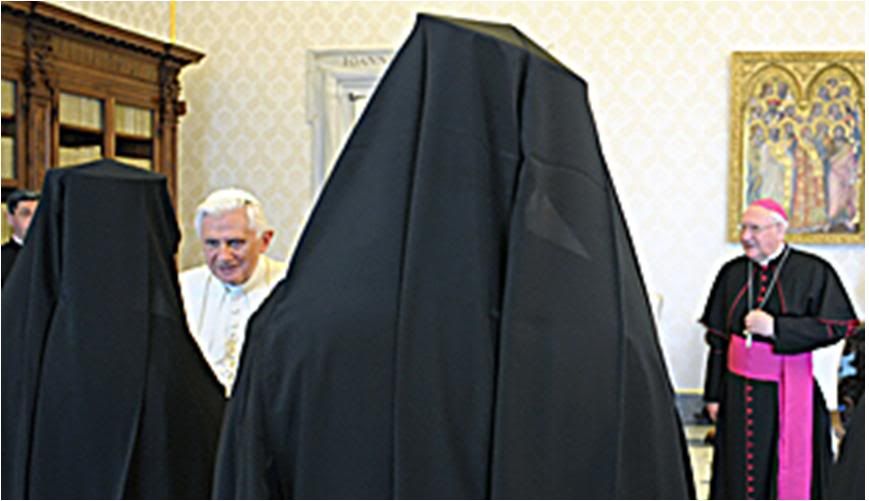 This is one of those annoying OR photos where the Pope is reduced to a small figure behind some inconsequential but dominant foreground!
This is one of those annoying OR photos where the Pope is reduced to a small figure behind some inconsequential but dominant foreground!
The Pope today received in audience the members of a delegation from the Ecumenical Patriarchate of Constantinople who came to Rome for the Solemnity of Sts. Peter and Paul Apostles.
The delegation, sent by His Holiness Bartholomew I, is composed of His Eminence Gennadios (Limouris), metropolitan of Sassima, joint secretary of the Joint International Commission for Theological Dialogue between the Catholic and Orthodox Churches, and vice moderator of the central committee of the World Council of Churches in Geneva, Switzerland; His Eminence Bartholomaios (Ioannis Kessidis), bishop of Arianzos, and assistant to the metropolitan of Germany; and Deacon Theodoros Meimaris from the Patriarchal See of Fanar.
Here is the address that the Holy Father delivered in English:
Dear Brothers in Christ,
"Grace to you and peace from God our Father" (Col 1:2).
With great joy and heartfelt affection I welcome you in the Lord to this City of Rome, on the occasion of the annual celebration of the martyrdom of Saints Peter and Paul.
Their feast, which the Catholic Church and the Orthodox Churches celebrate on the same day, is one of the most ancient of the liturgical year, and it testifies to a time when our communities were living in full communion with one another.
Your presence here today – for which I am deeply grateful to the Patriarch of Constantinople, His Holiness Bartholomaios I, and to the Holy Synod of the Ecumenical Patriarchate – brings great gladness to the hearts of us all.
I thank the Lord that the relations between us are characterized by sentiments of mutual trust, esteem and fraternity, as is amply testified by the many meetings that have already taken place in the course of this year.
All this gives grounds for hope that Catholic-Orthodox dialogue will also continue to make significant progress. Your Eminence is aware that the Joint International Commission for Theological Dialogue, of which you are Joint Secretary, is at a crucial point, having begun last October in Paphos to discuss the "The Role of the Bishop of Rome in the Communion of the Church in the First Millennium".
With all our hearts we pray that, enlightened by the Holy Spirit, the Members of the Commission will continue along this path during the forthcoming plenary session in Vienna, and devote to it the time needed for thorough study of this delicate and important issue.
For me it is an encouraging sign that Ecumenical Patriarch Bartholomaios I and the Holy Synod of Constantinople share our firm conviction of the importance of this dialogue, as His Holiness stated so clearly in the Patriarchal and Synodal Encyclical Letter on the occasion of Orthodoxy Sunday on 21 February 2010.
In the forthcoming Special Assembly for the Middle East of the Synod of Bishops, which I have convoked for the month of October here in Rome, I am certain that the theme of ecumenical cooperation between the Christians of that region will receive great attention.
Indeed, it is highlighted in the Instrumentum Laboris, which I consigned to the Catholic Bishops of the Middle East during my recent visit to Cyprus, where I was received with great fraternal warmth by His Beatitude Chrysostomos II, Archbishop of Nea Justiniana and All Cyprus.
The difficulties that the Christians of the Middle East are experiencing are in large measure common to all: living as a minority, and yearning for authentic religious freedom and for peace. Dialogue is needed with the Islamic and Jewish communities.
In this context I shall be very pleased to welcome the Fraternal Delegation which the Ecumenical Patriarch will send to participate in the work of the Synodal Assembly.
Your Eminence, dear members of the Delegation, I thank you for your visit. I ask you to convey my fraternal greetings to His Holiness Bartholomaios I, to the Holy Synod, to the clergy and all the faithful of the Ecumenical Patriarchate.
Through the intercession of the Apostles Peter and Paul, may the Lord grant us abundant blessings, and may he keep us always in his love.
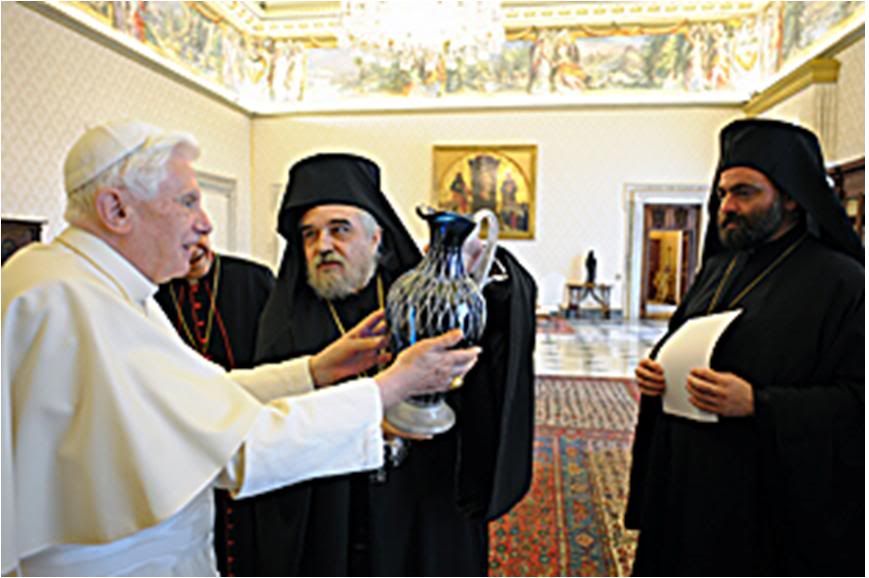
[Modificato da TERESA BENEDETTA 29/06/2010 07:23] |
| |
 29/06/2010 06:22 29/06/2010 06:22 |
|
| | | OFFLINE | | Post: 20.484
Post: 3.122 | Registrato il: 28/08/2005
Registrato il: 20/01/2009 | Administratore | Utente Master | |
|

 FIRST VESPERS
FIRST VESPERS
SOLEMNITY OF SAINTS PETER AND PAUL
 Illustration: 'Stand up straight on your feet' (Acts 14,10), St. Paul heals a lame man in Lystra. Fresco by Federio Zuccari, 1584, Cappella Paolina, Vatican Apostolic Palace.
Illustration: 'Stand up straight on your feet' (Acts 14,10), St. Paul heals a lame man in Lystra. Fresco by Federio Zuccari, 1584, Cappella Paolina, Vatican Apostolic Palace.
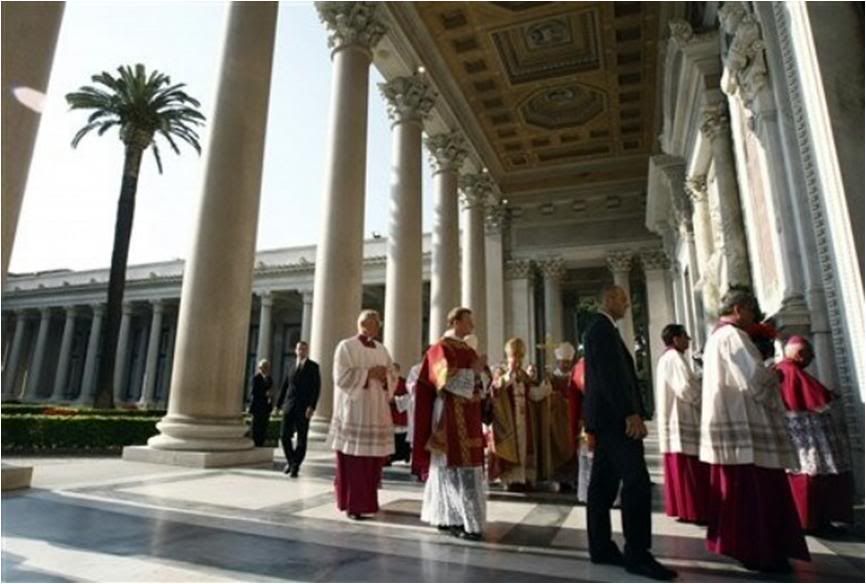
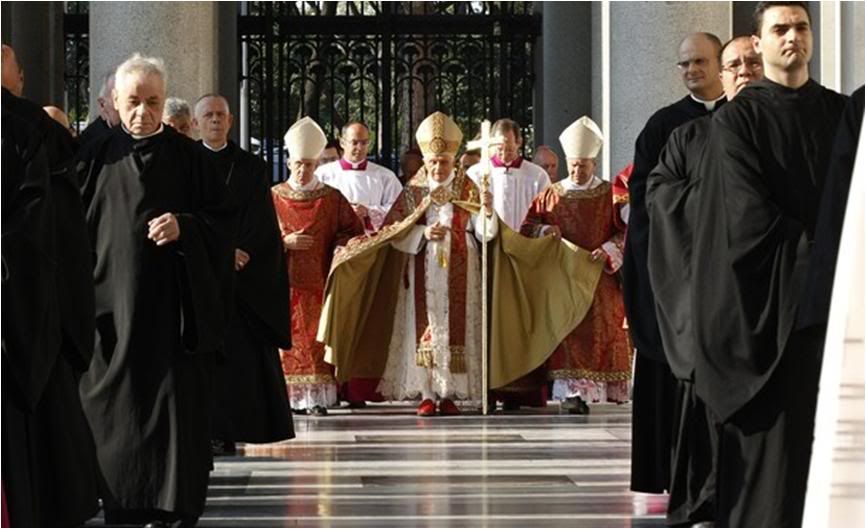
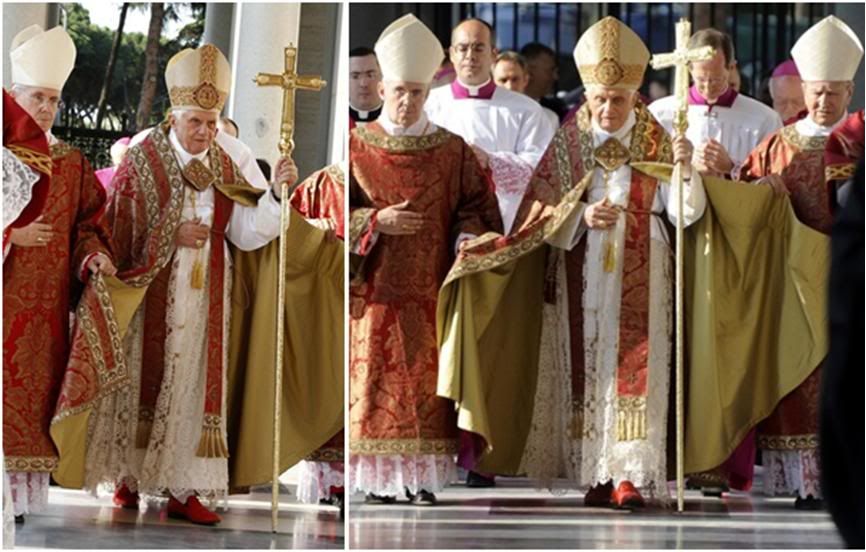

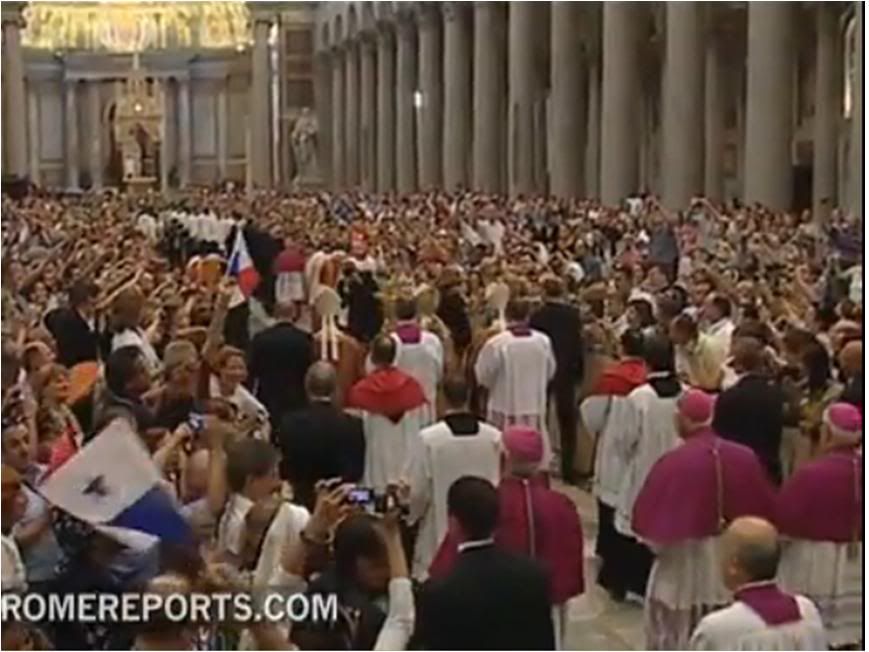
At 6 p.m. Monday, June 28, the Holy Father Benedetto XVI presided at First Vespers for the Solemnity of Saints Peter and Paul at the Baslica of St. Paul outside the Walls.
A delegation sent by Ecumenical Patriarch Bartholomew I from Constantinople took part, composed on His Eminence Gennadios (Limouris), Metropolitan of Sassima; H.E. Bartholomaios (Ioannis Kessidis), Bishop of Arianzós and assistant to the Metropolitan for Germany; and Rev. Deaccon Theodoros Meimaris, from teh patriarchal See in Phanar.
The Pope was welcomed on his arrival at the Basilica by Mons. Francesco Monterisi, Arch-Priest, and Fr. Edmund Power, abbot of the Benedictine monastery attached to the basilica.
Before the Vespers got underway, the Pope descended to the crypt under the main altar to pray at the tomb of St. Paul.
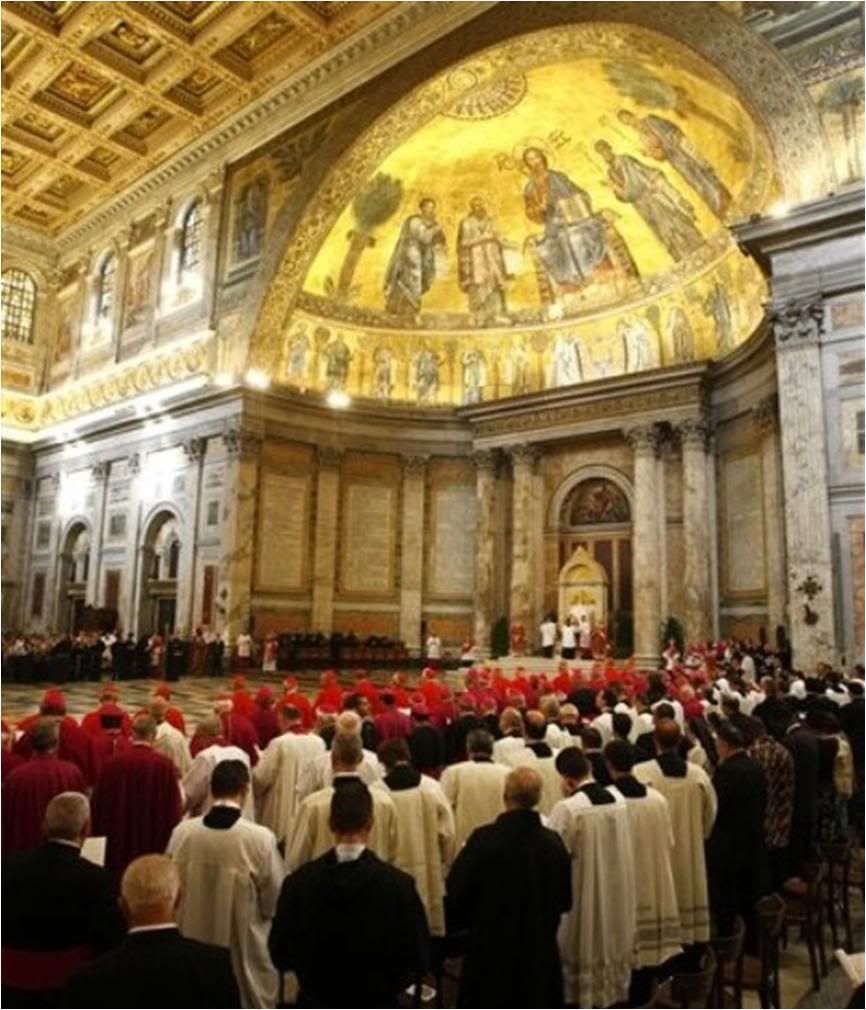
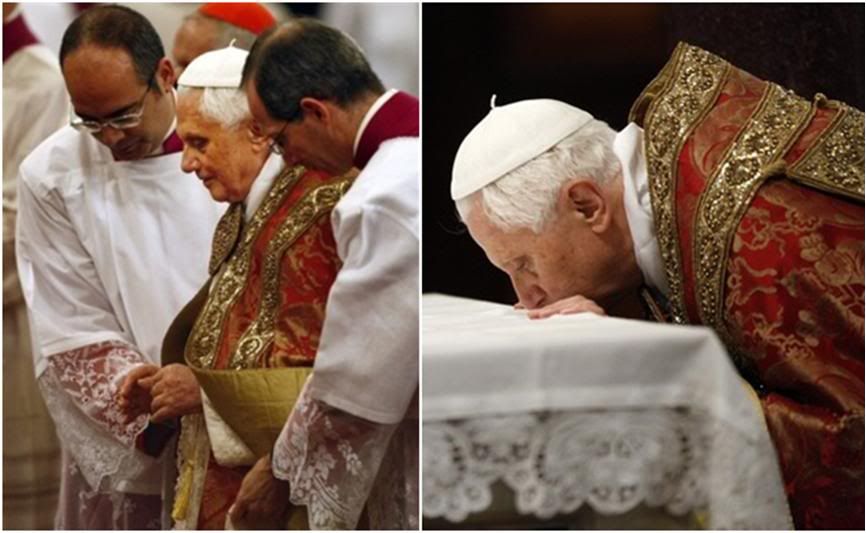
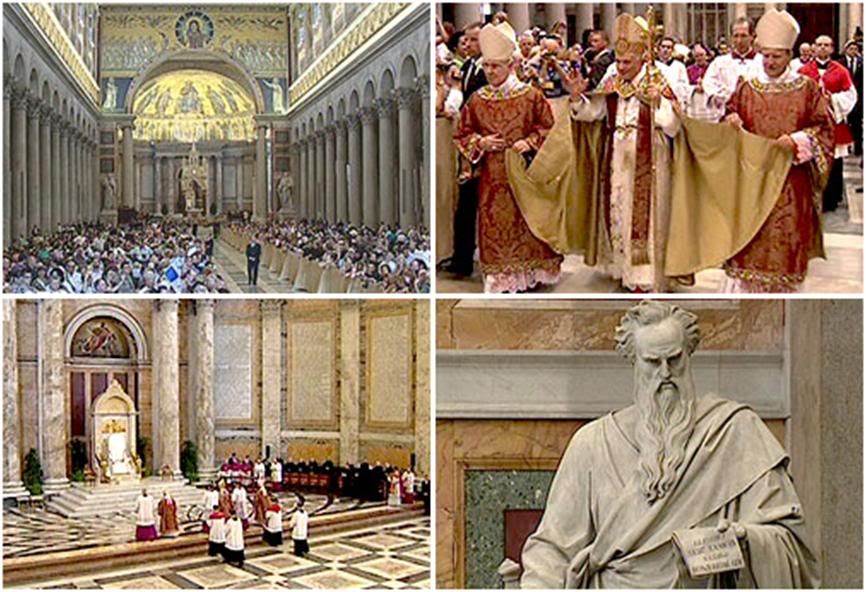 Pope announces new Pontifical Council
Pope announces new Pontifical Council
to re-evangelise secularized Christian nations

28 Jun 10 (RV) Pope Benedict announced the creation of a new Pontifical Council dedicated to New Evangelization on Monday evening, during the Vespers service marking the vigil of the Solemnity of Sts. Peter and Paul.
Pope Benedict chose the main shrine of the first great Christian missionary – St. Paul – to announce a new Pontifical Council dedicated to the evangelization of secularized Christian nations.
The Pope was celebrating the Vespers of the Vigil of the Solemnity of Sts. Peter and Paul in the Papal Basilica of St. Paul Outside the Walls.
During his homily, he spoke of how his predecessor, Pope John Paul II, had urgently proclaimed a new evangelization, aimed at countries which had long before received the Gospel.
Pope Benedict said he received this legacy upon his own election to the Chair of Peter, and noted the challenges of the present time are mostly spiritual.
He said he wanted to give the new Pontifical Council the task of promoting new evangelization in countries with deep Christian roots which are now experiencing an “eclipse of God”, becoming increasingly secularized.
He said this situation presents a challenge to find the appropriate means in which to revive the perennial truth of the Gospel of Christ in the secularized nations.
Addressing the delegation sent by the Patriarch Bartholomew I, the Holy Father said 'new evangelization' also asks Christians to urgently pursue the quest for full unity among Christians.
He said it was a sign of hope that the Churches of Rome and Constantinople have been practising reciprocal visits during the feast days of their respective patron saints.
On Tuesday morning, the Pope will preside at Mass in St. Peter’s Basilica, where he will bestow the Pallium on 38 metropolitan archbishops.
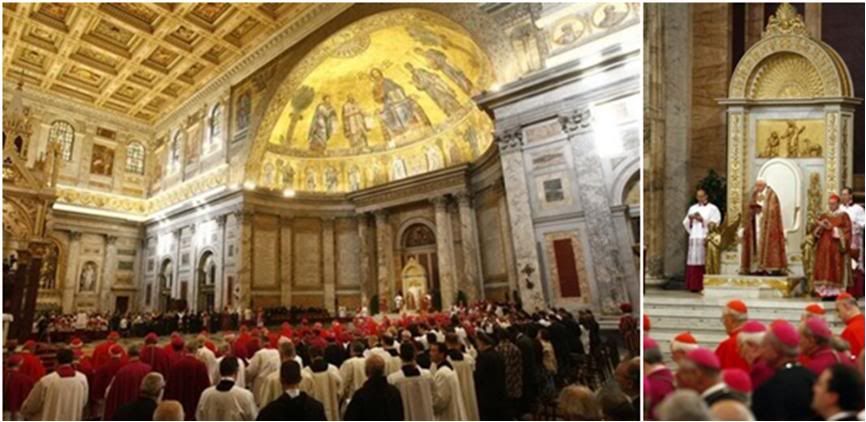
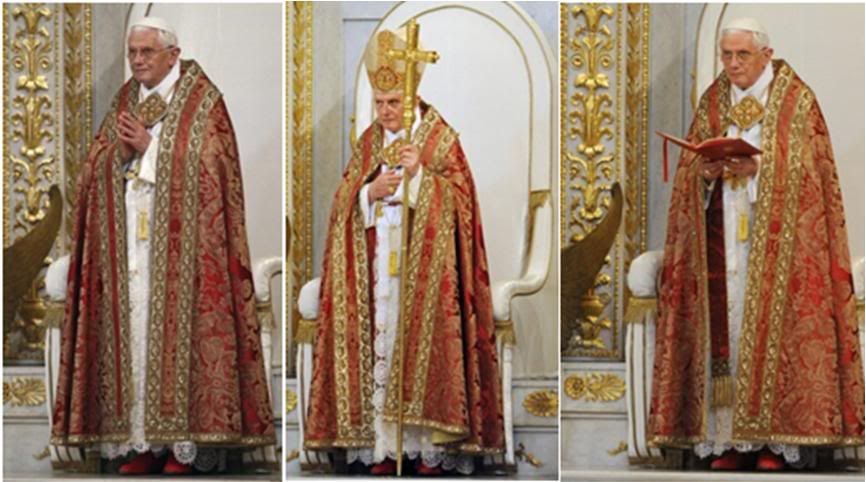
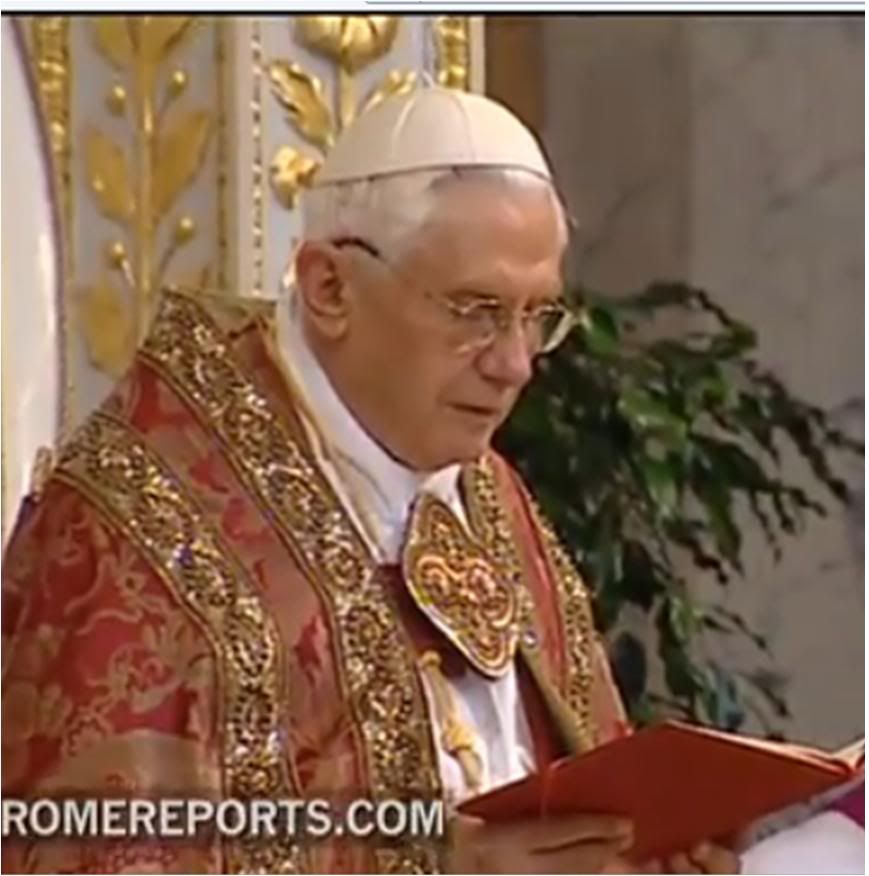
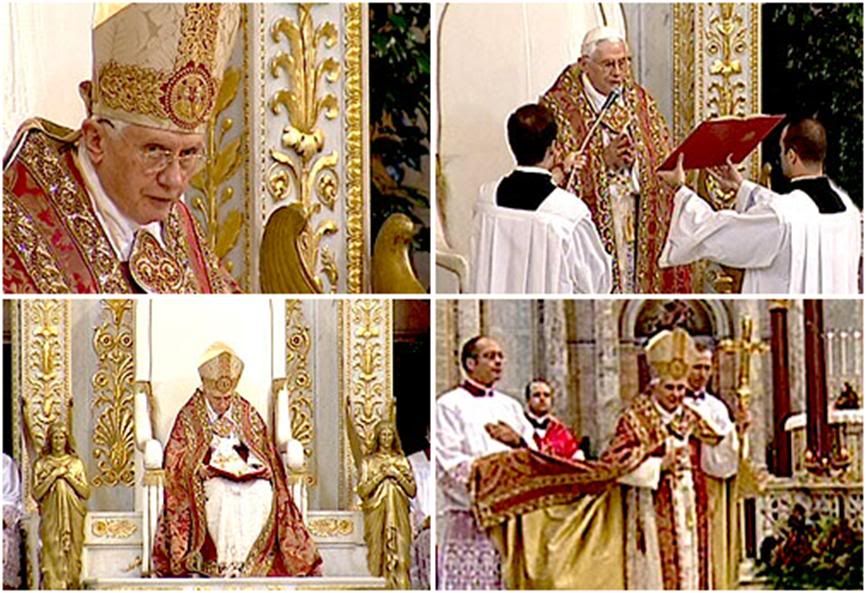
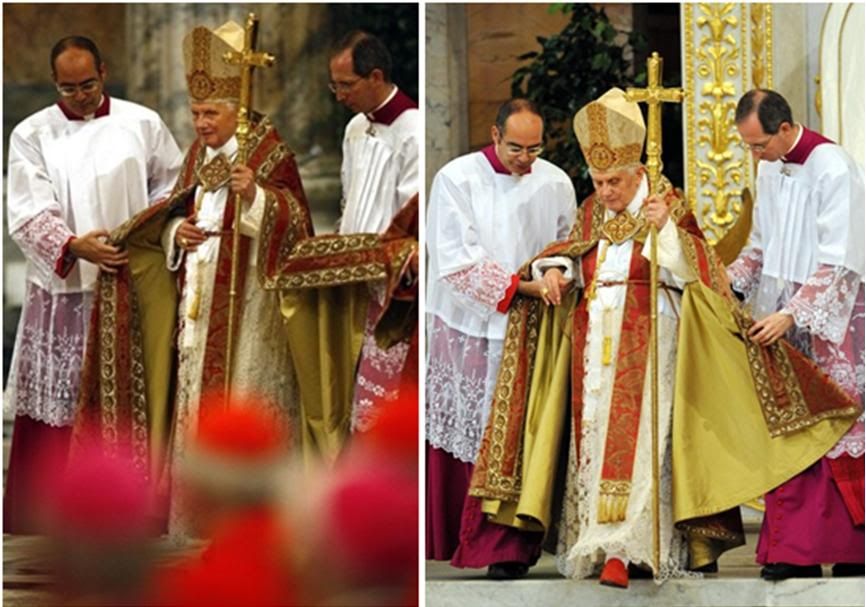
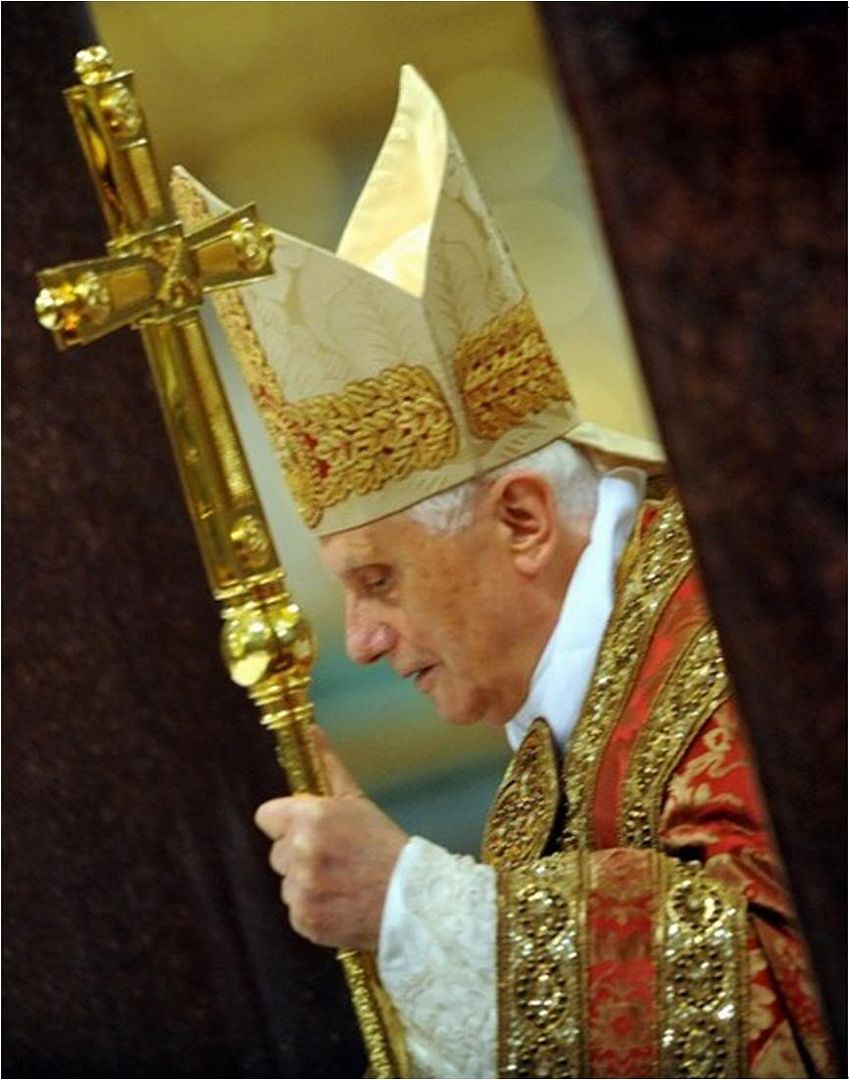
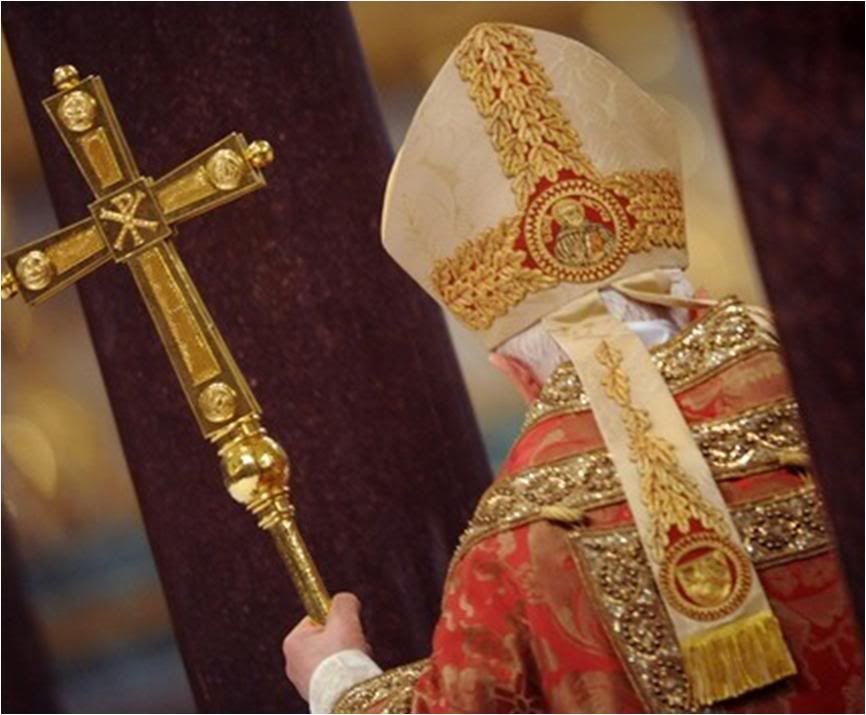
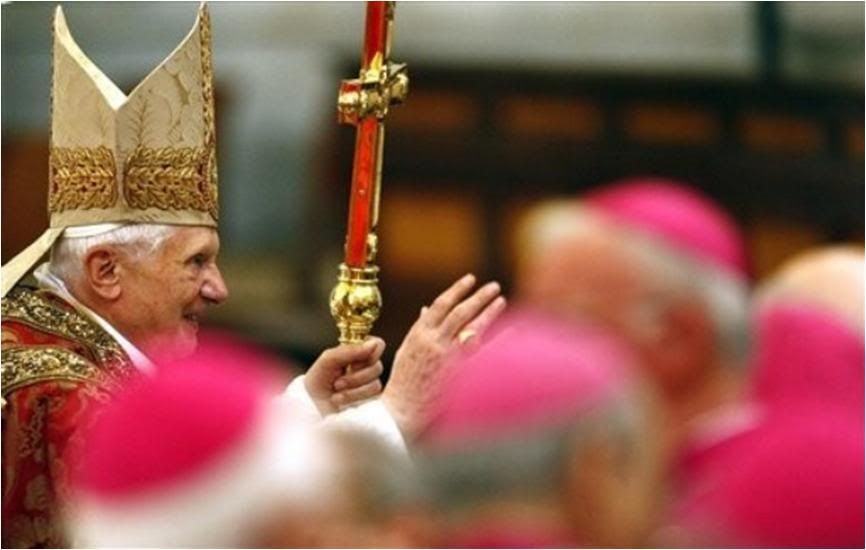 Pope announces creation of
Pope announces creation of
a pontifical council for new evangelization
By Cindy Wooden

VATICAN CITY, June 28 (CNS) -- Pope Benedict XVI announced he is establishing a pontifical council for new evangelization to find ways "to re-propose the perennial truth of the Gospel" in regions where secularism is smothering Church practice.
Leading an evening prayer service June 28 at Rome's Basilica of St. Paul Outside the Walls, Pope Benedict said there are areas of the globe that have been Christian for centuries, but where "the process of secularization has produced a serious crisis" in their people's sense of what it means to be Christian and to belong to the Church.
"I have decided to create a new organism, in the form of a pontifical council, with the principal task of promoting a renewed evangelization in the countries where the first proclamation of faith has already resounded and where there are churches of ancient foundation present, but which are living through a progressive secularization of society and a kind of 'eclipse of the sense of God,'" he said.
The challenge, he said, is to find ways to help people rediscover the value of faith.
The Pope did not say what the formal name of the pontifical council would be and he did not announce who would head it, although in the weeks leading to the announcement, Vatican commentators suggested it would be Italian Archbishop Rino Fisichella, currently president of the Pontifical Academy for Life. [He would not be expected to announce nominations of any kind during a homily!]
Pope Benedict made the announcement at the basilica built over what is believed to be the tomb of St. Paul, who dedicated "his entire existence and his hard work for the kingdom of God," the pope said.
The Pontifical Council for Health Care Ministry, established by Pope John Paul II in 1985, was the last pontifical council created.
The Pope's evening prayer service marked the vigil of the feast of Sts. Peter and Paul, the Vatican's patron saints and the symbols of the Church's unity and its universality, he said.
Saying he wanted to focus the evening service on the universal aspect of the Church, Pope Benedict recalled how Pope John Paul II repeatedly used the phrase "new evangelization" to describe the need for a new commitment to spreading the Gospel message in countries evangelized centuries ago, and the need to find new ways to preach the Gospel that correspond both to the truth and to the needs of modern men and women.
The Pope said the social and religious challenges of the modern world cannot be met by human strength and ingenuity alone. In fact, he said, he and other Church leaders often feel like the disciples of Jesus faced with a hungry crowd but having only a few fish and a couple loaves of bread to divide among them.
"Jesus showed them that with faith in God nothing is impossible and that a few loaves of bread and fish, blessed and shared, could satisfy everyone," he said.
"But there wasn't -- and there isn't -- only hunger for material food: There is a deeper hunger, which only God can satisfy," the pope said.
Men and women today want "an authentic and full life, they need truth, profound freedom, unconditional love. Even in the deserts of the secularized world, the human soul thirsts for God," he said.
Welcoming a delegation from the Ecumenical Orthodox Patriarchate of Constantinople, the Pope said the task of new evangelization also is tied to the commitment to work for Christian unity.
"May the intercession of Sts. Peter and Paul obtain for the whole church an ardent faith and apostolic courage to announce to the world the truth we all need, the truth that is God," the Pope prayed.
|
| |
 29/06/2010 13:51 29/06/2010 13:51 |
|
| | | OFFLINE | | Post: 20.485
Post: 3.123 | Registrato il: 28/08/2005
Registrato il: 20/01/2009 | Administratore | Utente Master | |
|
 When all of us become children
When all of us become children
by JOSEPH RATZINGER
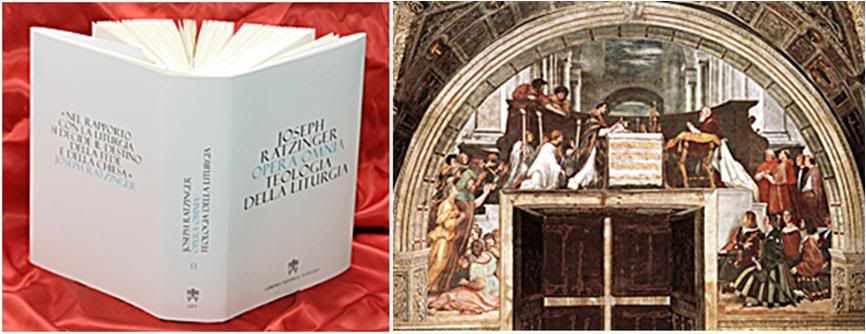 Teologia della liturgia: La fondazione sacramentale dell'esistenza Cristiana (Vatican City, LEV, 2010, 849 pp, 55 euro) is the volume that inaugurates the publication of the Italian translation by Ingrid Stampa of Joseph Ratzinger's Opera Omnia (Collected Works). The Italian edition is edited by Edmond Caruana and Pierluca Azzaro.
Teologia della liturgia: La fondazione sacramentale dell'esistenza Cristiana (Vatican City, LEV, 2010, 849 pp, 55 euro) is the volume that inaugurates the publication of the Italian translation by Ingrid Stampa of Joseph Ratzinger's Opera Omnia (Collected Works). The Italian edition is edited by Edmond Caruana and Pierluca Azzaro.
"When, after some hesitation, I decided to approve the project of publishing all my writings," Benedict XVI wrote on June 29, 2008, "it was clear to me that it should be according to the order of priority followed by the (Second Vatican) Council. and therefore, it should start with my writings about liturgy. The liturgy of the Church has been, since my childhood, the central reality of my life and, in the theological school of masters like Schamus. Soehngen, Pascher and Guardini, it had also become the center of my theological commitment".
We publish here the start of the first Chapter of Vol. I dedicated to the "nature of liturgy', along with the Preface written for the Italian edition by Cardinal Tarcisio Bertone.
Liturgy - what is it really? What takes place in it? What kind of reality do we encounter?
In the 1920s, it was proposed to consider liturgy as 'play' - the term of comparison was first of all, the fact that liturgy, like play, has its own rules, creates its own world, which is valid once you enter and which naturally recedes when play is over.
Another term of comparison was the fact that a game has sense, but at the same time, it has no specific purpose, and therefore it is somewhat therapeutic, even liberating, because it makes us leave the world of daily routine withits constraints and introduces us to a dimension without purpose, thus liberating us for a certain time from all the weight of our world of work.
Play would be, so to speak, a different world, an oasis of freedom, in which for some time, we can let our being 'flow' freely - we need such moments of escape from the tyranny of daily routine in order to be able to bear its weight.
There is something true in all this, but such an observation does not suffice. Indeed, what kind of play we dedicate ourselves to would then be basically secondary. Everything above can be applied to any game, in which the intrinsically necessary seriousness of observing its rules soon becomes an effort in itself and also leads to elaborating new specific purposes.
If we think of the present world of sport, the world chess championship or any other game, it is evident in all cases that play has the completely different dimension of an alternative world or a non-world, but soon becomes a specific world with its own laws if one is not simply to lose onself in simple empty leisure.
There is yet another aspect of the theory of play that merits mention and which brings us much closer to the particular nature of liturgy: child's play appears largely as a kind of anticipating life, as an exercise for entering into later life, without the actual effort and its seriousness.
Thus, liturgy can lead us to think that before getting to the true and proper life that we wish to reach, we basically remain as children, or at least, we should remain children. Then, liturgy becomes a completely different kind of anticipation, of preliminary exercise: a prelude to a future life, to eternal life which, as St. Augustine says, unlike the present life, is no longer characterized by needs and necessity, but entirely of the freedom to give and of giving itself.
Then, liturgy would be an awakening of the true child in our most intimate core, an awakening of our interior openness to the great things that await us which will not be fulfilled even in our adult life.
It would be a structured form of hope which already anticipates that future life, the real one, which trains us for authentic life: that of freedom, of God's immediacy, and of direct reciprocal openness.
It would also imprint on our apparently real life, that of the day-to-day, the anticipatory signs of the freedom that shatters constraints and brings to earth a reflection of heaven.
Such an interpretation of the theory of play differentiates liturgy essentially from common play, because it retains the 'nostalgia' for true 'play'- for the total 'otherness' of a world in which order and freedom blend into each other.
In comparison to the superficial and humanly void character of usual play, such an interpretation causes to emerge that special quality and otherness of the 'play' of Wisdom, which the Bible speaks about, and which therefore can be related to liturgy.
But an essential content is still lacking from this sketch, since the idea of future life has so far appeared only as a vague postulate, and looking at God, without which any 'future life' could only be a desert, still remains indeterminate. Thus I wish to propose a new approach, this time starting with the concreteness of Biblical texts.
In the narration of the events that preceded Israel's coming out of Egypt, just as in the actual event itself, two different purposes emerge for the exodus.
One, known to all, is to reach the Promised Land, where Israel could finally live on its own territory, with secure borders, as a people with its own freedom and independence.
Alongside that end, however, an indication of a different end appears repeatedly. The original command by God to the Pharaoh was "Let my people go, so they can serve me in the desert!" (Ex 7,16). This command "Let my people go so they can serve me in the desert" is repeated with small variations four times, in each of the encounters between the Pharaoh and Moses/Aaron (Ex 7,26; 9,1; 9,13; 10,3).
During their negotiations with the Pharaoh, the objective is further concretized. For him, the conflict has to do with the Israelites' freedom of worship, which he initially concedes this way: "Go and sacrifice to your God provided you do not go far away" (Ex 8,24).
After the succession of plagues, the Pharaoh widens his offer of compromise. Now he concedes that the worship be done according to the will of the divinity, namely, in the desert, but demands that only men can do this, and that women and children, along with their animals, must remain in Egypt.
He presumed a cultual practice that was current then, according to which only men could be active protagonists in worship. But Moses could not negotiate the modality of worship with a foreigner - he could not subordinate worship to political compromises: the way to render worship is not a question that can be resolved politically.
Worship has its own norms - it can be regulated only on the basis of Revelation, starting from God. That is why he also rejected the sovereign's third offer of compromise, who now broadened it to include even the women and children. "But your flocks and herds must remain!" (Ex 10,24).
Moses objects that they should bring all their animals with them because "we ourselves shall not know which ones we must sacrifice to him until we arrive at the place itself" (Ex 10,26).
None of this is about the Promised Land: the only purpose of the Exodus appears to be adoration, which can only take place according to God's norm, and is therefore not subject to the rules of the game of political compromise.
Israel was not leaving Egypt to be a people like everyone else - it was leaving to serve God. The destination of the Exodus is the mountain of God, still unknown, and its purpose was to render service to God.
At this point, one might object that remaining obstinate about worship in the negotiations with the Pharaoh was tactical in nature. The real and, definitely, the only purpose of the Exodus was not worship but the Land, which constituted the true and proper content of the promise made to Abraham.
I do not think this does justice to the seriousness that dominates these texts. Basically, an opposition between Land and worship makes no sense: the Land is given so that it may be a place for adoration of the true God.
The simple possession of the Land, mere national autonomy, would demote Israel to the level of all other peoples. To reduce everything to this end would mean a failure to recognize the specialness of God's choice: the entire history narrated by the books of Judges and Kings, taken up again and reinterpreted in Chronicles, shows precisely this. Land in itself, taken by itself, is a still indeterminate benefit - it would become true good, the real gift of a promise fulfilled, only if God reigns in it, not just because the land exists in some way as an autonomous State, but if it is the space for obedience, in which the will of God is done, as only in this way can human existence carry on in a just way.
Examination of the Biblical text, however, gives us an even more precise definition of the relationship between the two aims of the Exodus. It is true that Israel on the move still did not know after three days (as Moses said in his discourse with the Pharaoh) what kind of sacrifice God demanded.
Three months after their departure, however, "on its first day, the Israelites came to the desert of Sinai" (Ex 19,1). And on the third day, God came down to the mountain peak (19,16-20). And now he speaks to the people: In the holy Decalogue (20,1-17) he communicates his will, and through Moses, he establishes the Covenant (Ex 24) which is concretized in a minutely regulated form of worship.
Thus the purpose of the pilgrimage into the desert, which had been given to the Pharaoh, was fulfilled: Israel learned to venerate God in the way which he himself wishes.
Worship belongs to such veneration - liturgy in its true and proper sense. But it also requires living according to the will of God, which is an irrenunciable part of correct adoration.
"The glory of God is the living man, but the life of man is to see God", said St. Irinaeus, grasping the very nucleus of what took place at that encounter of the mountain in the desert of Sinai.
In short, the life of man itself, of the man who lives correctly, is the true adoration of God, but life becomes real only if it takes its form while one is looking at God. This is the purpose of worship: to allow such a look at God and thus to Live that liFe which becomes the glory of God.
[Modificato da TERESA BENEDETTA 29/06/2010 23:25] |
| |
 29/06/2010 13:52 29/06/2010 13:52 |
|
| | | OFFLINE | | Post: 20.486
Post: 3.124 | Registrato il: 28/08/2005
Registrato il: 20/01/2009 | Administratore | Utente Master | |
|
I'll be gone most of the day so I won't be posting until much later.
|
| |
|
|
|
|